Impact of Mobile Technology on Customer Satisfaction in the Tourism Industry
VerifiedAdded on 2024/05/31
|35
|7157
|245
AI Summary
This research project investigates the impact of mobile technology on customer satisfaction within the tourism industry. It explores the level of mobile technology usage by travelers, analyzes its influence on customer satisfaction, and examines the attitudes and perceptions of travelers towards mobile technology during different stages of their journeys. The study utilizes both primary and secondary data collection methods, including a structured questionnaire survey of 100 travelers, to gather insights into the relationship between mobile technology and customer satisfaction in the tourism sector.
Contribute Materials
Your contribution can guide someone’s learning journey. Share your
documents today.
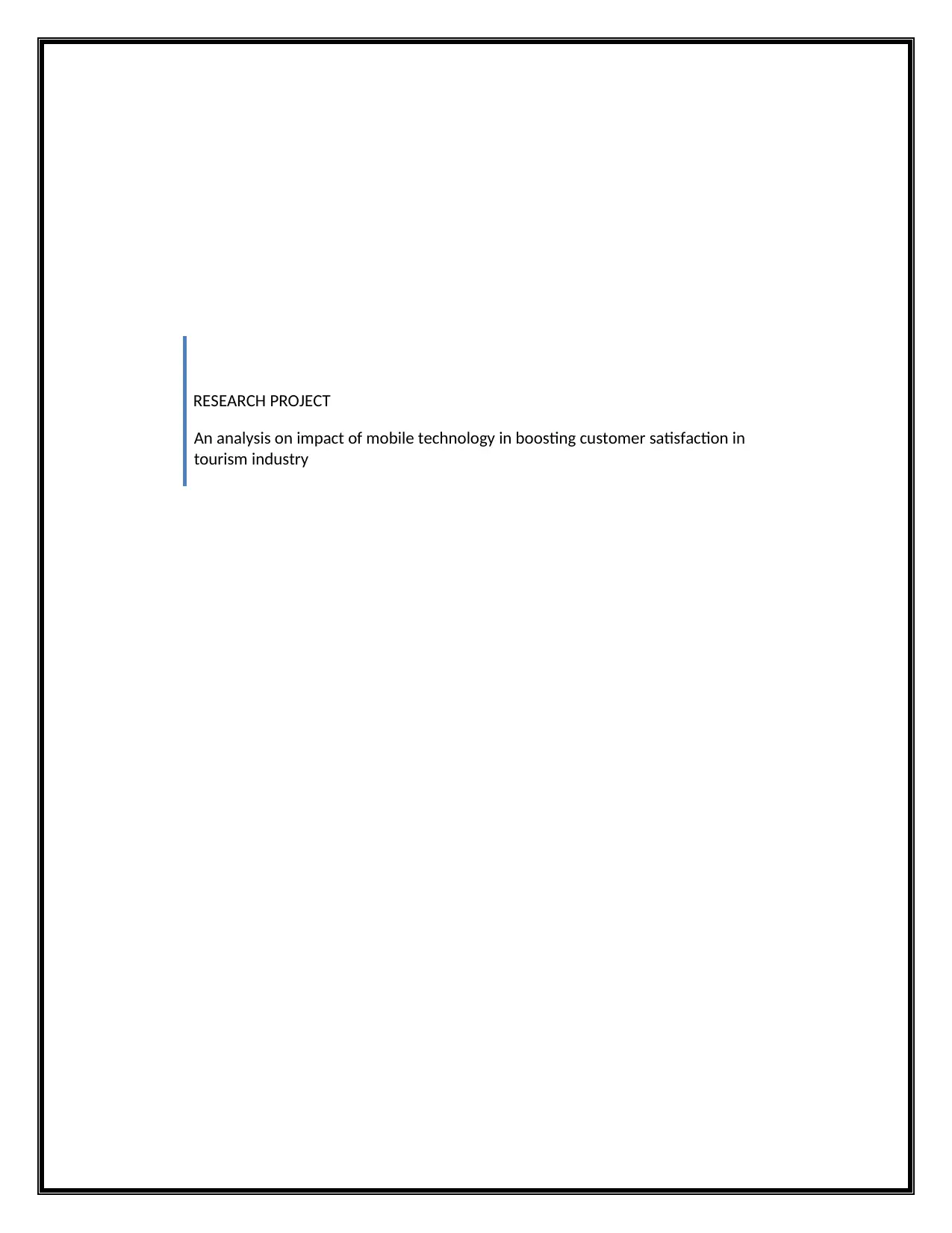
RESEARCH PROJECT
An analysis on impact of mobile technology in boosting customer satisfaction in
tourism industry
An analysis on impact of mobile technology in boosting customer satisfaction in
tourism industry
Secure Best Marks with AI Grader
Need help grading? Try our AI Grader for instant feedback on your assignments.
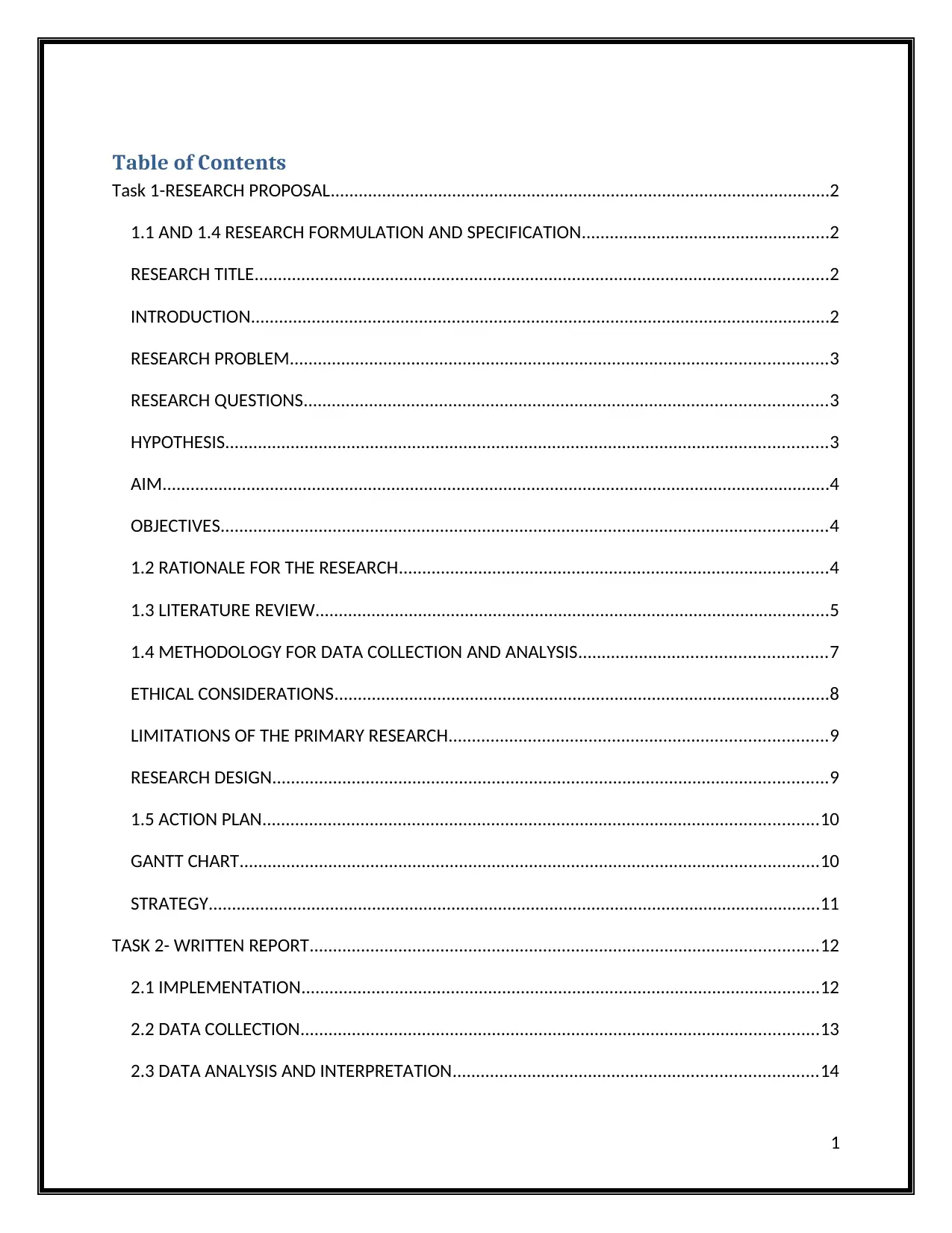
Table of Contents
Task 1-RESEARCH PROPOSAL...........................................................................................................2
1.1 AND 1.4 RESEARCH FORMULATION AND SPECIFICATION.....................................................2
RESEARCH TITLE...........................................................................................................................2
INTRODUCTION............................................................................................................................2
RESEARCH PROBLEM...................................................................................................................3
RESEARCH QUESTIONS................................................................................................................3
HYPOTHESIS.................................................................................................................................3
AIM...............................................................................................................................................4
OBJECTIVES..................................................................................................................................4
1.2 RATIONALE FOR THE RESEARCH............................................................................................4
1.3 LITERATURE REVIEW..............................................................................................................5
1.4 METHODOLOGY FOR DATA COLLECTION AND ANALYSIS.....................................................7
ETHICAL CONSIDERATIONS..........................................................................................................8
LIMITATIONS OF THE PRIMARY RESEARCH.................................................................................9
RESEARCH DESIGN.......................................................................................................................9
1.5 ACTION PLAN.......................................................................................................................10
GANTT CHART............................................................................................................................10
STRATEGY...................................................................................................................................11
TASK 2- WRITTEN REPORT.............................................................................................................12
2.1 IMPLEMENTATION...............................................................................................................12
2.2 DATA COLLECTION...............................................................................................................13
2.3 DATA ANALYSIS AND INTERPRETATION..............................................................................14
1
Task 1-RESEARCH PROPOSAL...........................................................................................................2
1.1 AND 1.4 RESEARCH FORMULATION AND SPECIFICATION.....................................................2
RESEARCH TITLE...........................................................................................................................2
INTRODUCTION............................................................................................................................2
RESEARCH PROBLEM...................................................................................................................3
RESEARCH QUESTIONS................................................................................................................3
HYPOTHESIS.................................................................................................................................3
AIM...............................................................................................................................................4
OBJECTIVES..................................................................................................................................4
1.2 RATIONALE FOR THE RESEARCH............................................................................................4
1.3 LITERATURE REVIEW..............................................................................................................5
1.4 METHODOLOGY FOR DATA COLLECTION AND ANALYSIS.....................................................7
ETHICAL CONSIDERATIONS..........................................................................................................8
LIMITATIONS OF THE PRIMARY RESEARCH.................................................................................9
RESEARCH DESIGN.......................................................................................................................9
1.5 ACTION PLAN.......................................................................................................................10
GANTT CHART............................................................................................................................10
STRATEGY...................................................................................................................................11
TASK 2- WRITTEN REPORT.............................................................................................................12
2.1 IMPLEMENTATION...............................................................................................................12
2.2 DATA COLLECTION...............................................................................................................13
2.3 DATA ANALYSIS AND INTERPRETATION..............................................................................14
1
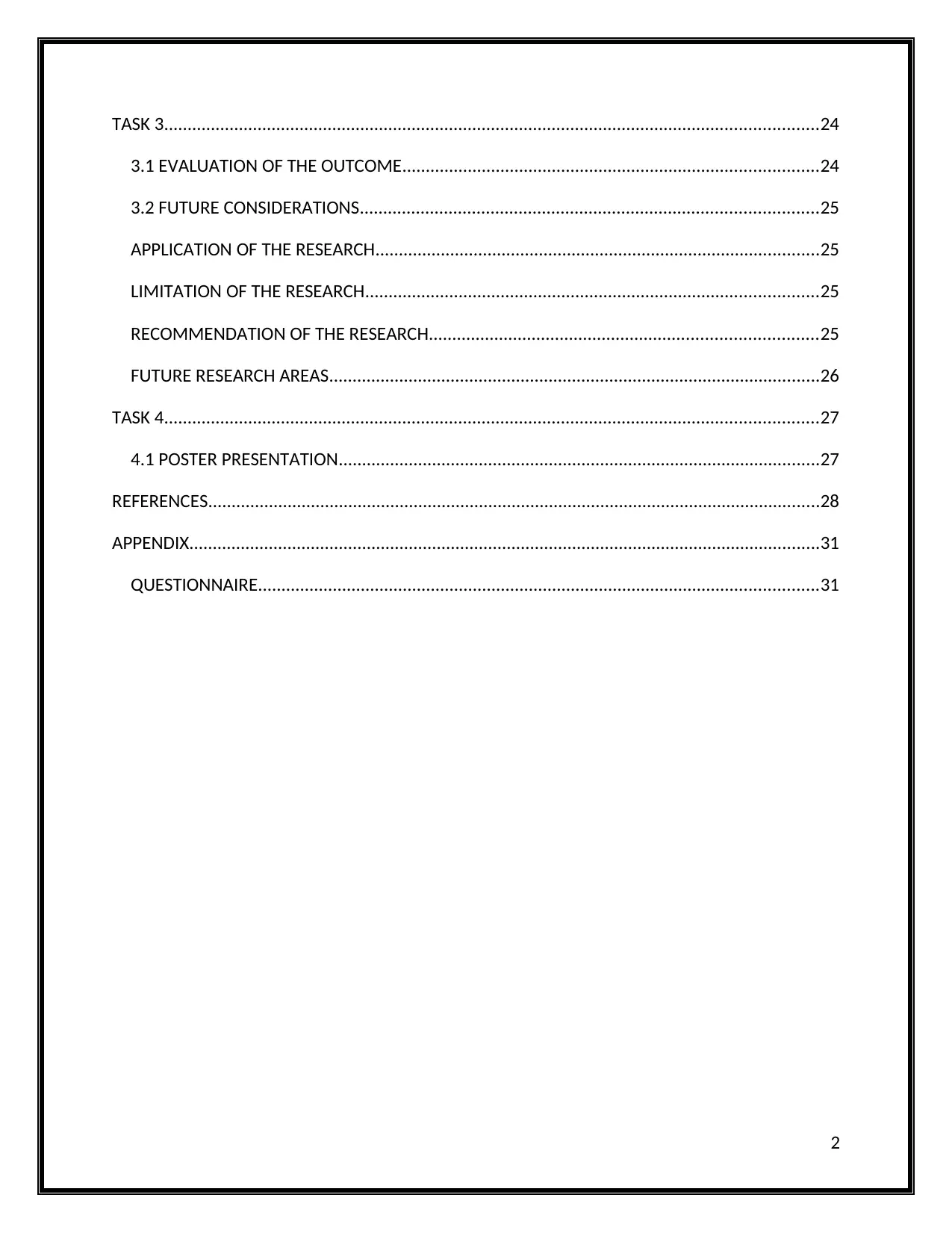
TASK 3............................................................................................................................................24
3.1 EVALUATION OF THE OUTCOME.........................................................................................24
3.2 FUTURE CONSIDERATIONS..................................................................................................25
APPLICATION OF THE RESEARCH...............................................................................................25
LIMITATION OF THE RESEARCH.................................................................................................25
RECOMMENDATION OF THE RESEARCH...................................................................................25
FUTURE RESEARCH AREAS.........................................................................................................26
TASK 4............................................................................................................................................27
4.1 POSTER PRESENTATION.......................................................................................................27
REFERENCES...................................................................................................................................28
APPENDIX.......................................................................................................................................31
QUESTIONNAIRE........................................................................................................................31
2
3.1 EVALUATION OF THE OUTCOME.........................................................................................24
3.2 FUTURE CONSIDERATIONS..................................................................................................25
APPLICATION OF THE RESEARCH...............................................................................................25
LIMITATION OF THE RESEARCH.................................................................................................25
RECOMMENDATION OF THE RESEARCH...................................................................................25
FUTURE RESEARCH AREAS.........................................................................................................26
TASK 4............................................................................................................................................27
4.1 POSTER PRESENTATION.......................................................................................................27
REFERENCES...................................................................................................................................28
APPENDIX.......................................................................................................................................31
QUESTIONNAIRE........................................................................................................................31
2
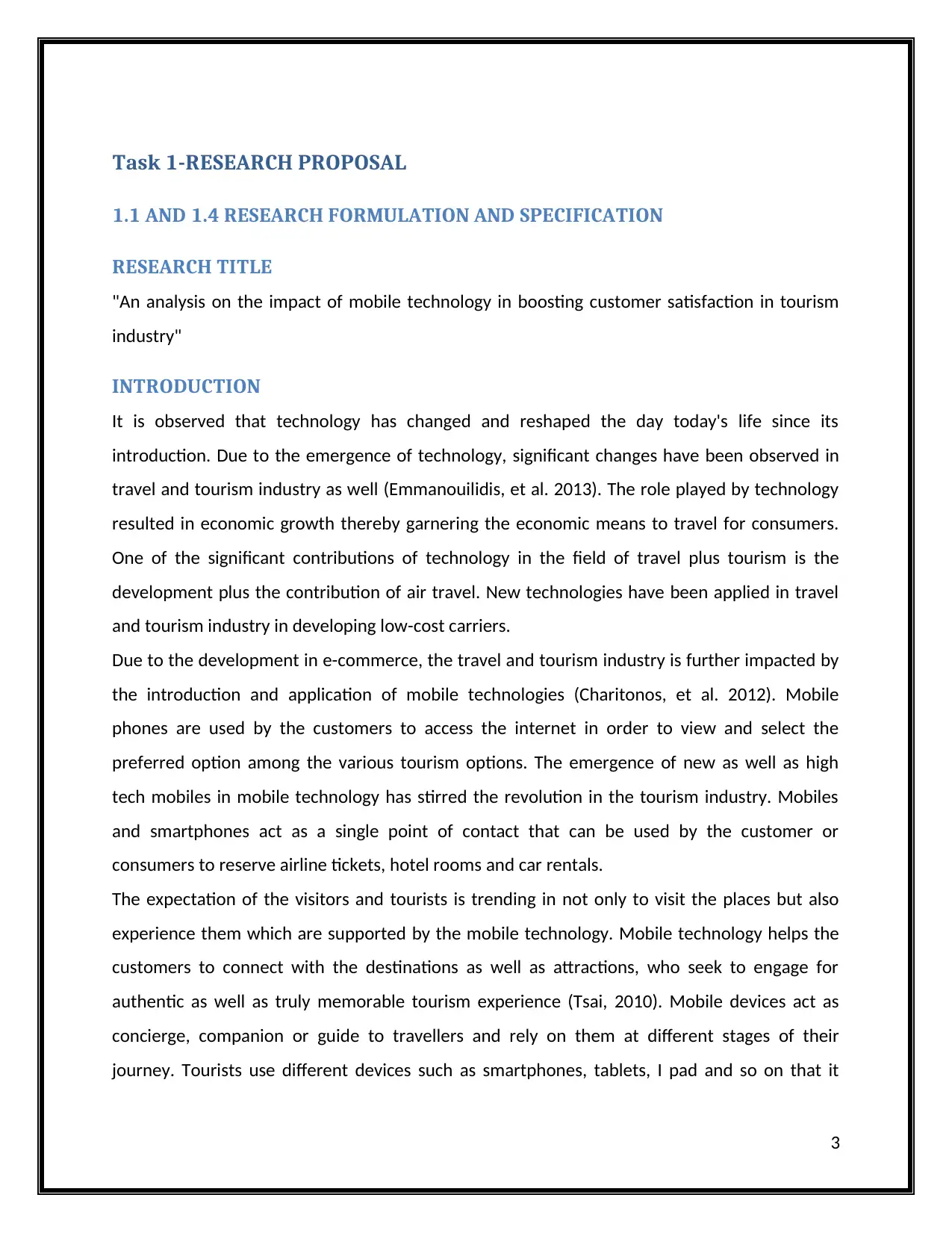
Task 1-RESEARCH PROPOSAL
1.1 AND 1.4 RESEARCH FORMULATION AND SPECIFICATION
RESEARCH TITLE
"An analysis on the impact of mobile technology in boosting customer satisfaction in tourism
industry"
INTRODUCTION
It is observed that technology has changed and reshaped the day today's life since its
introduction. Due to the emergence of technology, significant changes have been observed in
travel and tourism industry as well (Emmanouilidis, et al. 2013). The role played by technology
resulted in economic growth thereby garnering the economic means to travel for consumers.
One of the significant contributions of technology in the field of travel plus tourism is the
development plus the contribution of air travel. New technologies have been applied in travel
and tourism industry in developing low-cost carriers.
Due to the development in e-commerce, the travel and tourism industry is further impacted by
the introduction and application of mobile technologies (Charitonos, et al. 2012). Mobile
phones are used by the customers to access the internet in order to view and select the
preferred option among the various tourism options. The emergence of new as well as high
tech mobiles in mobile technology has stirred the revolution in the tourism industry. Mobiles
and smartphones act as a single point of contact that can be used by the customer or
consumers to reserve airline tickets, hotel rooms and car rentals.
The expectation of the visitors and tourists is trending in not only to visit the places but also
experience them which are supported by the mobile technology. Mobile technology helps the
customers to connect with the destinations as well as attractions, who seek to engage for
authentic as well as truly memorable tourism experience (Tsai, 2010). Mobile devices act as
concierge, companion or guide to travellers and rely on them at different stages of their
journey. Tourists use different devices such as smartphones, tablets, I pad and so on that it
3
1.1 AND 1.4 RESEARCH FORMULATION AND SPECIFICATION
RESEARCH TITLE
"An analysis on the impact of mobile technology in boosting customer satisfaction in tourism
industry"
INTRODUCTION
It is observed that technology has changed and reshaped the day today's life since its
introduction. Due to the emergence of technology, significant changes have been observed in
travel and tourism industry as well (Emmanouilidis, et al. 2013). The role played by technology
resulted in economic growth thereby garnering the economic means to travel for consumers.
One of the significant contributions of technology in the field of travel plus tourism is the
development plus the contribution of air travel. New technologies have been applied in travel
and tourism industry in developing low-cost carriers.
Due to the development in e-commerce, the travel and tourism industry is further impacted by
the introduction and application of mobile technologies (Charitonos, et al. 2012). Mobile
phones are used by the customers to access the internet in order to view and select the
preferred option among the various tourism options. The emergence of new as well as high
tech mobiles in mobile technology has stirred the revolution in the tourism industry. Mobiles
and smartphones act as a single point of contact that can be used by the customer or
consumers to reserve airline tickets, hotel rooms and car rentals.
The expectation of the visitors and tourists is trending in not only to visit the places but also
experience them which are supported by the mobile technology. Mobile technology helps the
customers to connect with the destinations as well as attractions, who seek to engage for
authentic as well as truly memorable tourism experience (Tsai, 2010). Mobile devices act as
concierge, companion or guide to travellers and rely on them at different stages of their
journey. Tourists use different devices such as smartphones, tablets, I pad and so on that it
3
Secure Best Marks with AI Grader
Need help grading? Try our AI Grader for instant feedback on your assignments.
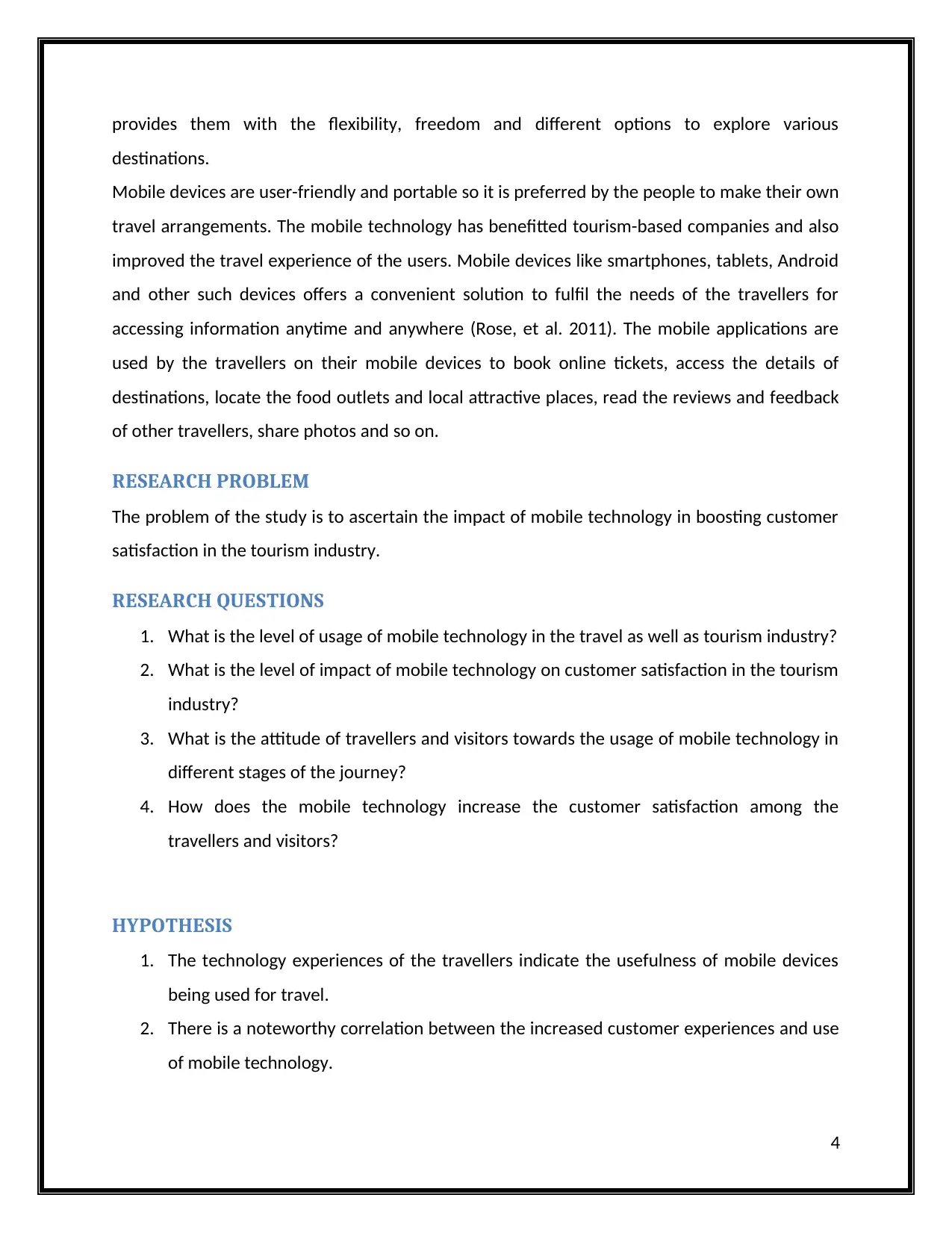
provides them with the flexibility, freedom and different options to explore various
destinations.
Mobile devices are user-friendly and portable so it is preferred by the people to make their own
travel arrangements. The mobile technology has benefitted tourism-based companies and also
improved the travel experience of the users. Mobile devices like smartphones, tablets, Android
and other such devices offers a convenient solution to fulfil the needs of the travellers for
accessing information anytime and anywhere (Rose, et al. 2011). The mobile applications are
used by the travellers on their mobile devices to book online tickets, access the details of
destinations, locate the food outlets and local attractive places, read the reviews and feedback
of other travellers, share photos and so on.
RESEARCH PROBLEM
The problem of the study is to ascertain the impact of mobile technology in boosting customer
satisfaction in the tourism industry.
RESEARCH QUESTIONS
1. What is the level of usage of mobile technology in the travel as well as tourism industry?
2. What is the level of impact of mobile technology on customer satisfaction in the tourism
industry?
3. What is the attitude of travellers and visitors towards the usage of mobile technology in
different stages of the journey?
4. How does the mobile technology increase the customer satisfaction among the
travellers and visitors?
HYPOTHESIS
1. The technology experiences of the travellers indicate the usefulness of mobile devices
being used for travel.
2. There is a noteworthy correlation between the increased customer experiences and use
of mobile technology.
4
destinations.
Mobile devices are user-friendly and portable so it is preferred by the people to make their own
travel arrangements. The mobile technology has benefitted tourism-based companies and also
improved the travel experience of the users. Mobile devices like smartphones, tablets, Android
and other such devices offers a convenient solution to fulfil the needs of the travellers for
accessing information anytime and anywhere (Rose, et al. 2011). The mobile applications are
used by the travellers on their mobile devices to book online tickets, access the details of
destinations, locate the food outlets and local attractive places, read the reviews and feedback
of other travellers, share photos and so on.
RESEARCH PROBLEM
The problem of the study is to ascertain the impact of mobile technology in boosting customer
satisfaction in the tourism industry.
RESEARCH QUESTIONS
1. What is the level of usage of mobile technology in the travel as well as tourism industry?
2. What is the level of impact of mobile technology on customer satisfaction in the tourism
industry?
3. What is the attitude of travellers and visitors towards the usage of mobile technology in
different stages of the journey?
4. How does the mobile technology increase the customer satisfaction among the
travellers and visitors?
HYPOTHESIS
1. The technology experiences of the travellers indicate the usefulness of mobile devices
being used for travel.
2. There is a noteworthy correlation between the increased customer experiences and use
of mobile technology.
4
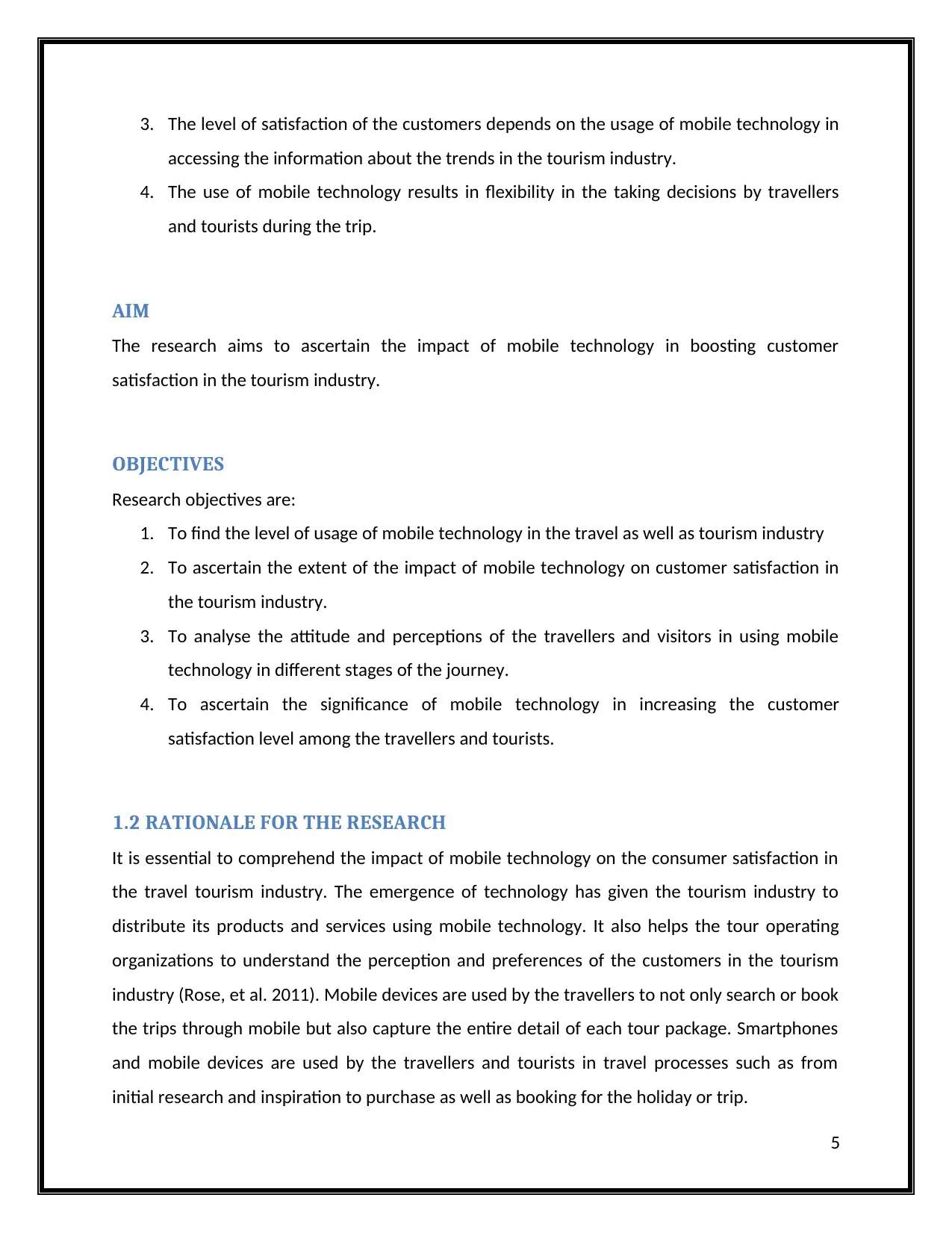
3. The level of satisfaction of the customers depends on the usage of mobile technology in
accessing the information about the trends in the tourism industry.
4. The use of mobile technology results in flexibility in the taking decisions by travellers
and tourists during the trip.
AIM
The research aims to ascertain the impact of mobile technology in boosting customer
satisfaction in the tourism industry.
OBJECTIVES
Research objectives are:
1. To find the level of usage of mobile technology in the travel as well as tourism industry
2. To ascertain the extent of the impact of mobile technology on customer satisfaction in
the tourism industry.
3. To analyse the attitude and perceptions of the travellers and visitors in using mobile
technology in different stages of the journey.
4. To ascertain the significance of mobile technology in increasing the customer
satisfaction level among the travellers and tourists.
1.2 RATIONALE FOR THE RESEARCH
It is essential to comprehend the impact of mobile technology on the consumer satisfaction in
the travel tourism industry. The emergence of technology has given the tourism industry to
distribute its products and services using mobile technology. It also helps the tour operating
organizations to understand the perception and preferences of the customers in the tourism
industry (Rose, et al. 2011). Mobile devices are used by the travellers to not only search or book
the trips through mobile but also capture the entire detail of each tour package. Smartphones
and mobile devices are used by the travellers and tourists in travel processes such as from
initial research and inspiration to purchase as well as booking for the holiday or trip.
5
accessing the information about the trends in the tourism industry.
4. The use of mobile technology results in flexibility in the taking decisions by travellers
and tourists during the trip.
AIM
The research aims to ascertain the impact of mobile technology in boosting customer
satisfaction in the tourism industry.
OBJECTIVES
Research objectives are:
1. To find the level of usage of mobile technology in the travel as well as tourism industry
2. To ascertain the extent of the impact of mobile technology on customer satisfaction in
the tourism industry.
3. To analyse the attitude and perceptions of the travellers and visitors in using mobile
technology in different stages of the journey.
4. To ascertain the significance of mobile technology in increasing the customer
satisfaction level among the travellers and tourists.
1.2 RATIONALE FOR THE RESEARCH
It is essential to comprehend the impact of mobile technology on the consumer satisfaction in
the travel tourism industry. The emergence of technology has given the tourism industry to
distribute its products and services using mobile technology. It also helps the tour operating
organizations to understand the perception and preferences of the customers in the tourism
industry (Rose, et al. 2011). Mobile devices are used by the travellers to not only search or book
the trips through mobile but also capture the entire detail of each tour package. Smartphones
and mobile devices are used by the travellers and tourists in travel processes such as from
initial research and inspiration to purchase as well as booking for the holiday or trip.
5
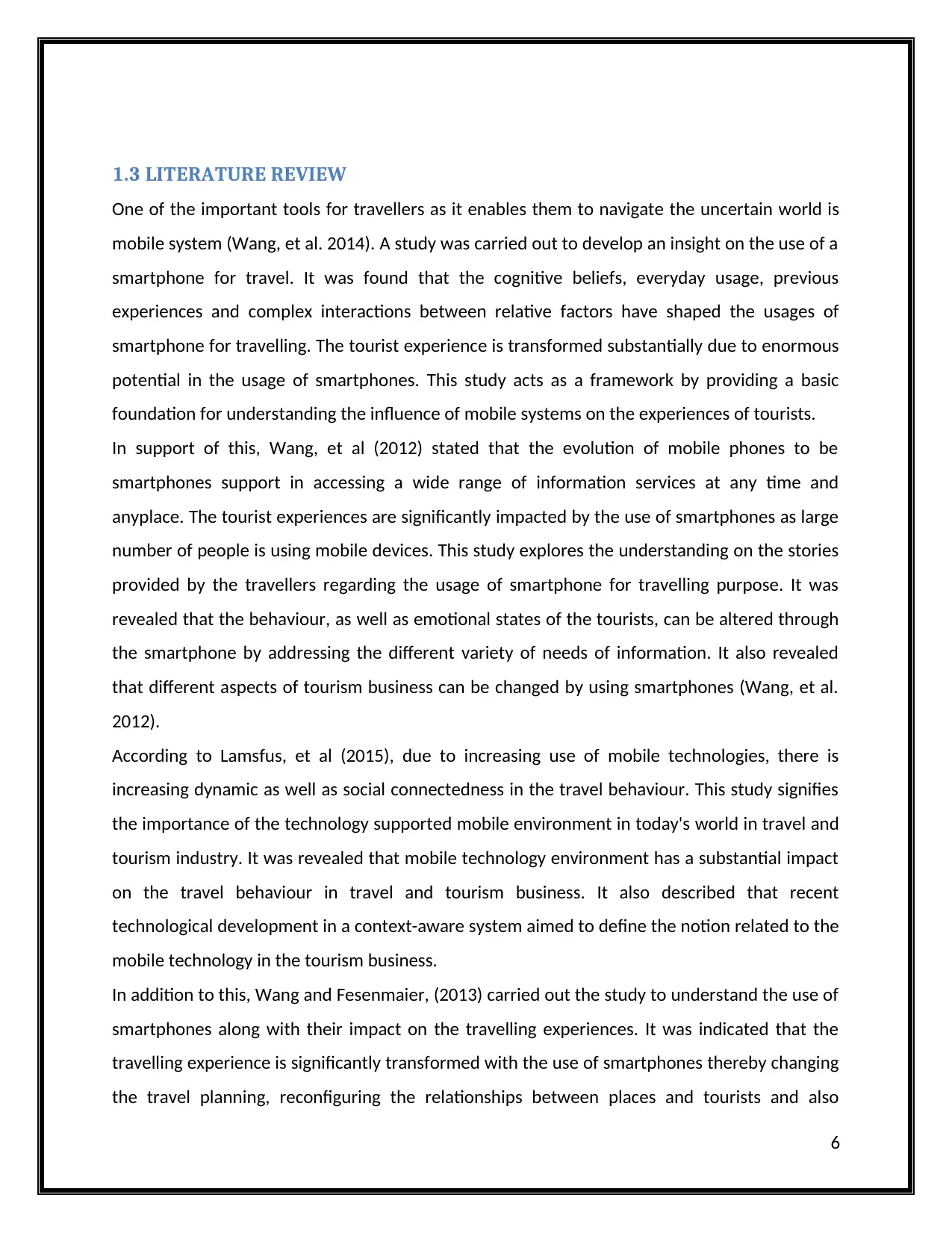
1.3 LITERATURE REVIEW
One of the important tools for travellers as it enables them to navigate the uncertain world is
mobile system (Wang, et al. 2014). A study was carried out to develop an insight on the use of a
smartphone for travel. It was found that the cognitive beliefs, everyday usage, previous
experiences and complex interactions between relative factors have shaped the usages of
smartphone for travelling. The tourist experience is transformed substantially due to enormous
potential in the usage of smartphones. This study acts as a framework by providing a basic
foundation for understanding the influence of mobile systems on the experiences of tourists.
In support of this, Wang, et al (2012) stated that the evolution of mobile phones to be
smartphones support in accessing a wide range of information services at any time and
anyplace. The tourist experiences are significantly impacted by the use of smartphones as large
number of people is using mobile devices. This study explores the understanding on the stories
provided by the travellers regarding the usage of smartphone for travelling purpose. It was
revealed that the behaviour, as well as emotional states of the tourists, can be altered through
the smartphone by addressing the different variety of needs of information. It also revealed
that different aspects of tourism business can be changed by using smartphones (Wang, et al.
2012).
According to Lamsfus, et al (2015), due to increasing use of mobile technologies, there is
increasing dynamic as well as social connectedness in the travel behaviour. This study signifies
the importance of the technology supported mobile environment in today's world in travel and
tourism industry. It was revealed that mobile technology environment has a substantial impact
on the travel behaviour in travel and tourism business. It also described that recent
technological development in a context-aware system aimed to define the notion related to the
mobile technology in the tourism business.
In addition to this, Wang and Fesenmaier, (2013) carried out the study to understand the use of
smartphones along with their impact on the travelling experiences. It was indicated that the
travelling experience is significantly transformed with the use of smartphones thereby changing
the travel planning, reconfiguring the relationships between places and tourists and also
6
One of the important tools for travellers as it enables them to navigate the uncertain world is
mobile system (Wang, et al. 2014). A study was carried out to develop an insight on the use of a
smartphone for travel. It was found that the cognitive beliefs, everyday usage, previous
experiences and complex interactions between relative factors have shaped the usages of
smartphone for travelling. The tourist experience is transformed substantially due to enormous
potential in the usage of smartphones. This study acts as a framework by providing a basic
foundation for understanding the influence of mobile systems on the experiences of tourists.
In support of this, Wang, et al (2012) stated that the evolution of mobile phones to be
smartphones support in accessing a wide range of information services at any time and
anyplace. The tourist experiences are significantly impacted by the use of smartphones as large
number of people is using mobile devices. This study explores the understanding on the stories
provided by the travellers regarding the usage of smartphone for travelling purpose. It was
revealed that the behaviour, as well as emotional states of the tourists, can be altered through
the smartphone by addressing the different variety of needs of information. It also revealed
that different aspects of tourism business can be changed by using smartphones (Wang, et al.
2012).
According to Lamsfus, et al (2015), due to increasing use of mobile technologies, there is
increasing dynamic as well as social connectedness in the travel behaviour. This study signifies
the importance of the technology supported mobile environment in today's world in travel and
tourism industry. It was revealed that mobile technology environment has a substantial impact
on the travel behaviour in travel and tourism business. It also described that recent
technological development in a context-aware system aimed to define the notion related to the
mobile technology in the tourism business.
In addition to this, Wang and Fesenmaier, (2013) carried out the study to understand the use of
smartphones along with their impact on the travelling experiences. It was indicated that the
travelling experience is significantly transformed with the use of smartphones thereby changing
the travel planning, reconfiguring the relationships between places and tourists and also
6
Paraphrase This Document
Need a fresh take? Get an instant paraphrase of this document with our AI Paraphraser
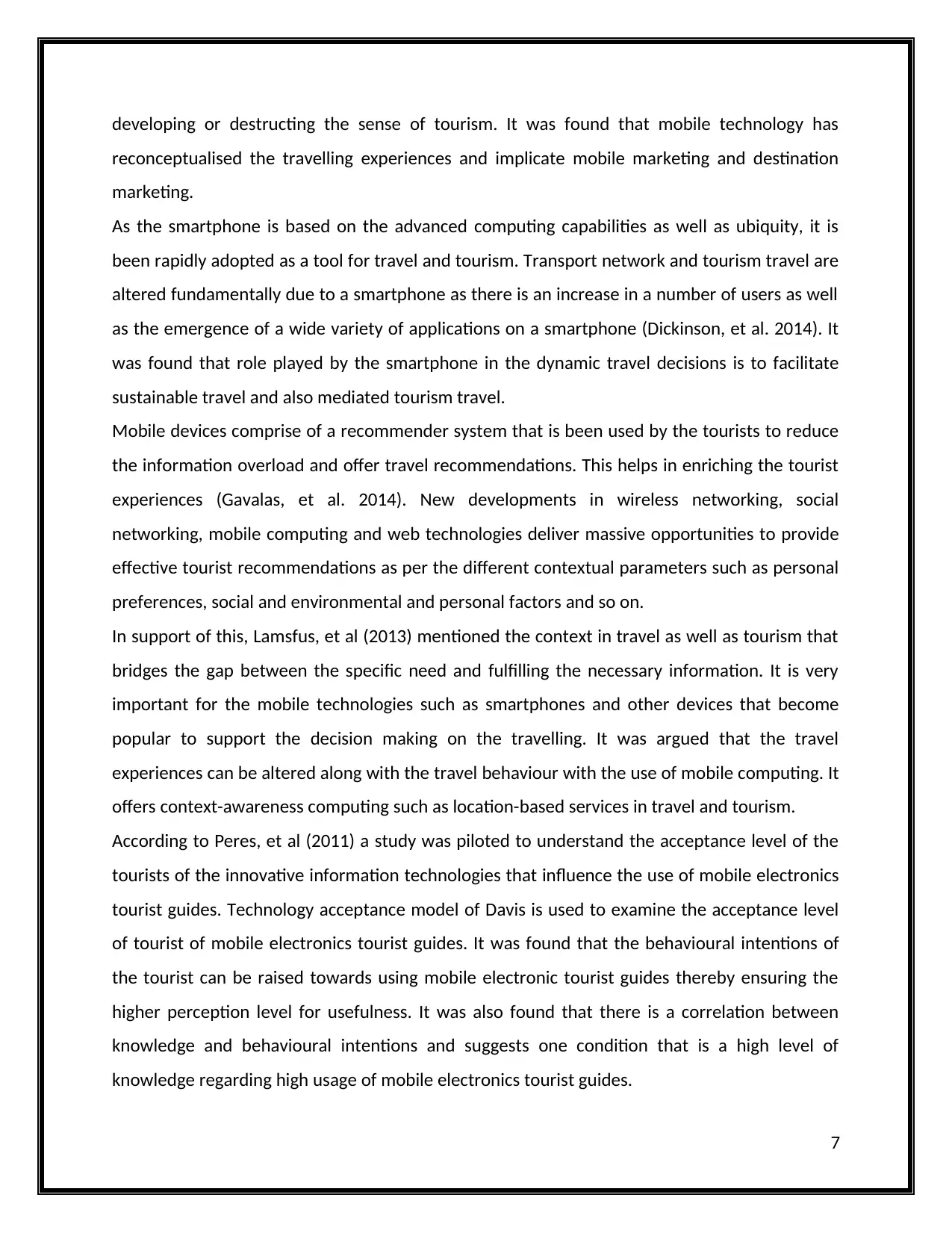
developing or destructing the sense of tourism. It was found that mobile technology has
reconceptualised the travelling experiences and implicate mobile marketing and destination
marketing.
As the smartphone is based on the advanced computing capabilities as well as ubiquity, it is
been rapidly adopted as a tool for travel and tourism. Transport network and tourism travel are
altered fundamentally due to a smartphone as there is an increase in a number of users as well
as the emergence of a wide variety of applications on a smartphone (Dickinson, et al. 2014). It
was found that role played by the smartphone in the dynamic travel decisions is to facilitate
sustainable travel and also mediated tourism travel.
Mobile devices comprise of a recommender system that is been used by the tourists to reduce
the information overload and offer travel recommendations. This helps in enriching the tourist
experiences (Gavalas, et al. 2014). New developments in wireless networking, social
networking, mobile computing and web technologies deliver massive opportunities to provide
effective tourist recommendations as per the different contextual parameters such as personal
preferences, social and environmental and personal factors and so on.
In support of this, Lamsfus, et al (2013) mentioned the context in travel as well as tourism that
bridges the gap between the specific need and fulfilling the necessary information. It is very
important for the mobile technologies such as smartphones and other devices that become
popular to support the decision making on the travelling. It was argued that the travel
experiences can be altered along with the travel behaviour with the use of mobile computing. It
offers context-awareness computing such as location-based services in travel and tourism.
According to Peres, et al (2011) a study was piloted to understand the acceptance level of the
tourists of the innovative information technologies that influence the use of mobile electronics
tourist guides. Technology acceptance model of Davis is used to examine the acceptance level
of tourist of mobile electronics tourist guides. It was found that the behavioural intentions of
the tourist can be raised towards using mobile electronic tourist guides thereby ensuring the
higher perception level for usefulness. It was also found that there is a correlation between
knowledge and behavioural intentions and suggests one condition that is a high level of
knowledge regarding high usage of mobile electronics tourist guides.
7
reconceptualised the travelling experiences and implicate mobile marketing and destination
marketing.
As the smartphone is based on the advanced computing capabilities as well as ubiquity, it is
been rapidly adopted as a tool for travel and tourism. Transport network and tourism travel are
altered fundamentally due to a smartphone as there is an increase in a number of users as well
as the emergence of a wide variety of applications on a smartphone (Dickinson, et al. 2014). It
was found that role played by the smartphone in the dynamic travel decisions is to facilitate
sustainable travel and also mediated tourism travel.
Mobile devices comprise of a recommender system that is been used by the tourists to reduce
the information overload and offer travel recommendations. This helps in enriching the tourist
experiences (Gavalas, et al. 2014). New developments in wireless networking, social
networking, mobile computing and web technologies deliver massive opportunities to provide
effective tourist recommendations as per the different contextual parameters such as personal
preferences, social and environmental and personal factors and so on.
In support of this, Lamsfus, et al (2013) mentioned the context in travel as well as tourism that
bridges the gap between the specific need and fulfilling the necessary information. It is very
important for the mobile technologies such as smartphones and other devices that become
popular to support the decision making on the travelling. It was argued that the travel
experiences can be altered along with the travel behaviour with the use of mobile computing. It
offers context-awareness computing such as location-based services in travel and tourism.
According to Peres, et al (2011) a study was piloted to understand the acceptance level of the
tourists of the innovative information technologies that influence the use of mobile electronics
tourist guides. Technology acceptance model of Davis is used to examine the acceptance level
of tourist of mobile electronics tourist guides. It was found that the behavioural intentions of
the tourist can be raised towards using mobile electronic tourist guides thereby ensuring the
higher perception level for usefulness. It was also found that there is a correlation between
knowledge and behavioural intentions and suggests one condition that is a high level of
knowledge regarding high usage of mobile electronics tourist guides.
7
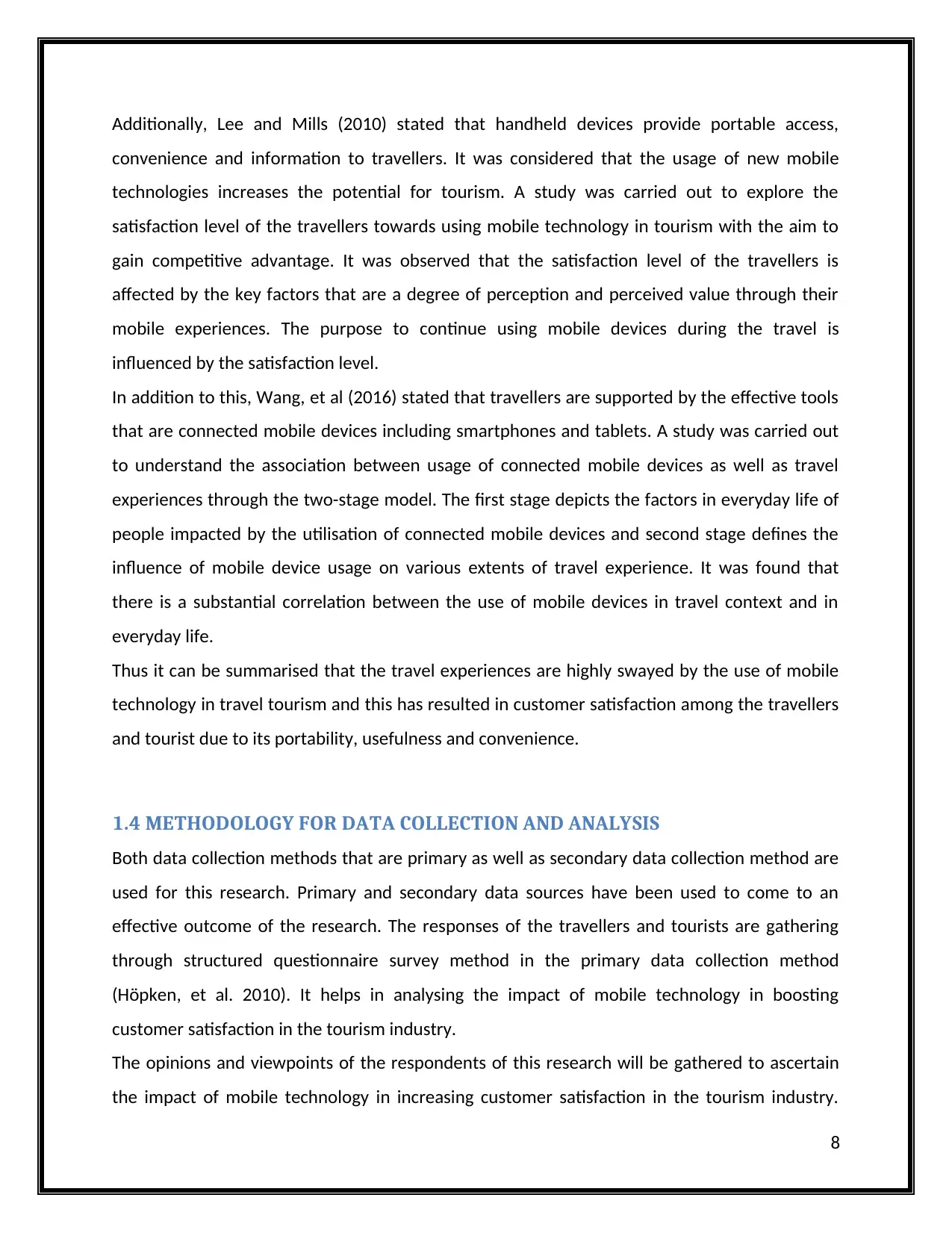
Additionally, Lee and Mills (2010) stated that handheld devices provide portable access,
convenience and information to travellers. It was considered that the usage of new mobile
technologies increases the potential for tourism. A study was carried out to explore the
satisfaction level of the travellers towards using mobile technology in tourism with the aim to
gain competitive advantage. It was observed that the satisfaction level of the travellers is
affected by the key factors that are a degree of perception and perceived value through their
mobile experiences. The purpose to continue using mobile devices during the travel is
influenced by the satisfaction level.
In addition to this, Wang, et al (2016) stated that travellers are supported by the effective tools
that are connected mobile devices including smartphones and tablets. A study was carried out
to understand the association between usage of connected mobile devices as well as travel
experiences through the two-stage model. The first stage depicts the factors in everyday life of
people impacted by the utilisation of connected mobile devices and second stage defines the
influence of mobile device usage on various extents of travel experience. It was found that
there is a substantial correlation between the use of mobile devices in travel context and in
everyday life.
Thus it can be summarised that the travel experiences are highly swayed by the use of mobile
technology in travel tourism and this has resulted in customer satisfaction among the travellers
and tourist due to its portability, usefulness and convenience.
1.4 METHODOLOGY FOR DATA COLLECTION AND ANALYSIS
Both data collection methods that are primary as well as secondary data collection method are
used for this research. Primary and secondary data sources have been used to come to an
effective outcome of the research. The responses of the travellers and tourists are gathering
through structured questionnaire survey method in the primary data collection method
(Höpken, et al. 2010). It helps in analysing the impact of mobile technology in boosting
customer satisfaction in the tourism industry.
The opinions and viewpoints of the respondents of this research will be gathered to ascertain
the impact of mobile technology in increasing customer satisfaction in the tourism industry.
8
convenience and information to travellers. It was considered that the usage of new mobile
technologies increases the potential for tourism. A study was carried out to explore the
satisfaction level of the travellers towards using mobile technology in tourism with the aim to
gain competitive advantage. It was observed that the satisfaction level of the travellers is
affected by the key factors that are a degree of perception and perceived value through their
mobile experiences. The purpose to continue using mobile devices during the travel is
influenced by the satisfaction level.
In addition to this, Wang, et al (2016) stated that travellers are supported by the effective tools
that are connected mobile devices including smartphones and tablets. A study was carried out
to understand the association between usage of connected mobile devices as well as travel
experiences through the two-stage model. The first stage depicts the factors in everyday life of
people impacted by the utilisation of connected mobile devices and second stage defines the
influence of mobile device usage on various extents of travel experience. It was found that
there is a substantial correlation between the use of mobile devices in travel context and in
everyday life.
Thus it can be summarised that the travel experiences are highly swayed by the use of mobile
technology in travel tourism and this has resulted in customer satisfaction among the travellers
and tourist due to its portability, usefulness and convenience.
1.4 METHODOLOGY FOR DATA COLLECTION AND ANALYSIS
Both data collection methods that are primary as well as secondary data collection method are
used for this research. Primary and secondary data sources have been used to come to an
effective outcome of the research. The responses of the travellers and tourists are gathering
through structured questionnaire survey method in the primary data collection method
(Höpken, et al. 2010). It helps in analysing the impact of mobile technology in boosting
customer satisfaction in the tourism industry.
The opinions and viewpoints of the respondents of this research will be gathered to ascertain
the impact of mobile technology in increasing customer satisfaction in the tourism industry.
8
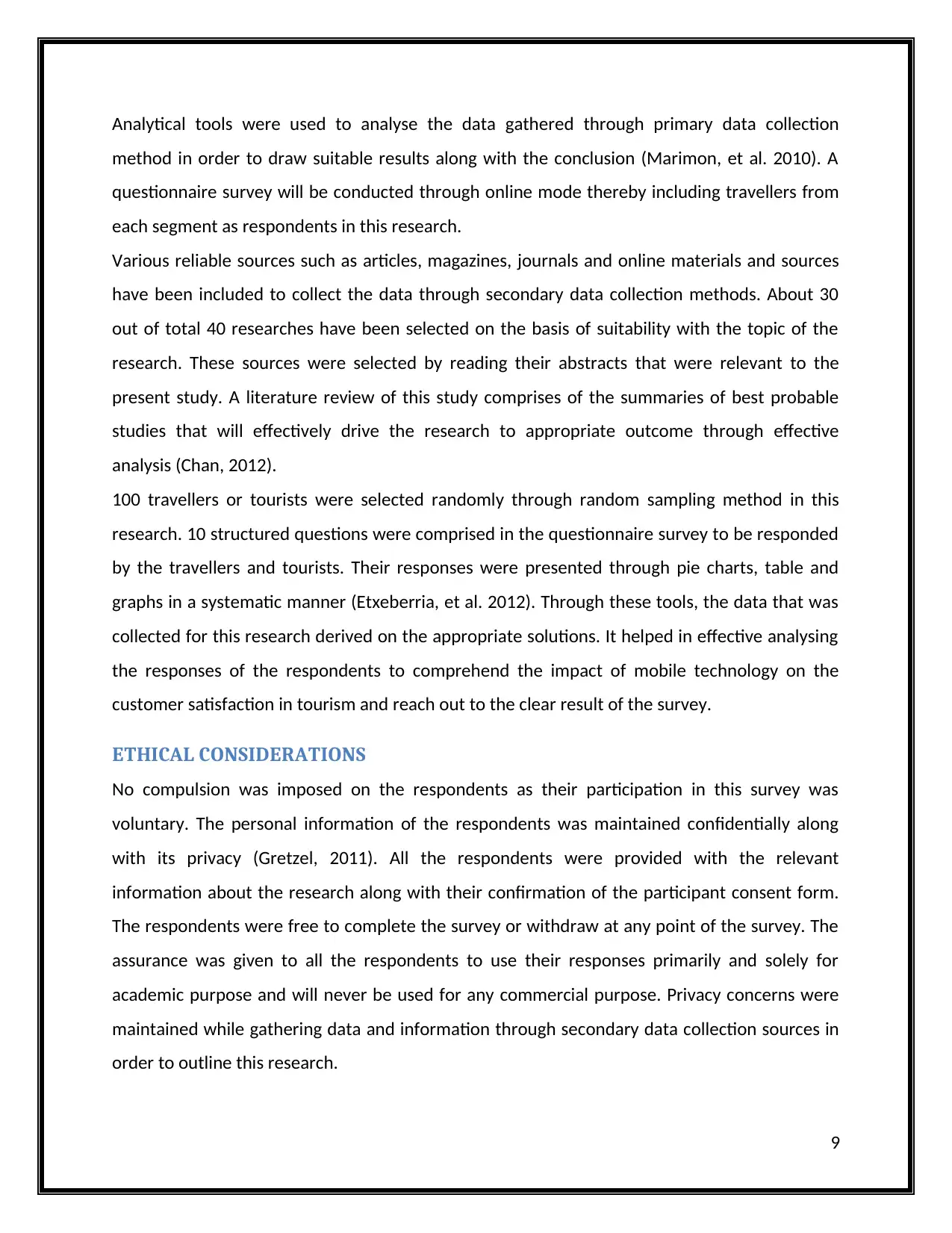
Analytical tools were used to analyse the data gathered through primary data collection
method in order to draw suitable results along with the conclusion (Marimon, et al. 2010). A
questionnaire survey will be conducted through online mode thereby including travellers from
each segment as respondents in this research.
Various reliable sources such as articles, magazines, journals and online materials and sources
have been included to collect the data through secondary data collection methods. About 30
out of total 40 researches have been selected on the basis of suitability with the topic of the
research. These sources were selected by reading their abstracts that were relevant to the
present study. A literature review of this study comprises of the summaries of best probable
studies that will effectively drive the research to appropriate outcome through effective
analysis (Chan, 2012).
100 travellers or tourists were selected randomly through random sampling method in this
research. 10 structured questions were comprised in the questionnaire survey to be responded
by the travellers and tourists. Their responses were presented through pie charts, table and
graphs in a systematic manner (Etxeberria, et al. 2012). Through these tools, the data that was
collected for this research derived on the appropriate solutions. It helped in effective analysing
the responses of the respondents to comprehend the impact of mobile technology on the
customer satisfaction in tourism and reach out to the clear result of the survey.
ETHICAL CONSIDERATIONS
No compulsion was imposed on the respondents as their participation in this survey was
voluntary. The personal information of the respondents was maintained confidentially along
with its privacy (Gretzel, 2011). All the respondents were provided with the relevant
information about the research along with their confirmation of the participant consent form.
The respondents were free to complete the survey or withdraw at any point of the survey. The
assurance was given to all the respondents to use their responses primarily and solely for
academic purpose and will never be used for any commercial purpose. Privacy concerns were
maintained while gathering data and information through secondary data collection sources in
order to outline this research.
9
method in order to draw suitable results along with the conclusion (Marimon, et al. 2010). A
questionnaire survey will be conducted through online mode thereby including travellers from
each segment as respondents in this research.
Various reliable sources such as articles, magazines, journals and online materials and sources
have been included to collect the data through secondary data collection methods. About 30
out of total 40 researches have been selected on the basis of suitability with the topic of the
research. These sources were selected by reading their abstracts that were relevant to the
present study. A literature review of this study comprises of the summaries of best probable
studies that will effectively drive the research to appropriate outcome through effective
analysis (Chan, 2012).
100 travellers or tourists were selected randomly through random sampling method in this
research. 10 structured questions were comprised in the questionnaire survey to be responded
by the travellers and tourists. Their responses were presented through pie charts, table and
graphs in a systematic manner (Etxeberria, et al. 2012). Through these tools, the data that was
collected for this research derived on the appropriate solutions. It helped in effective analysing
the responses of the respondents to comprehend the impact of mobile technology on the
customer satisfaction in tourism and reach out to the clear result of the survey.
ETHICAL CONSIDERATIONS
No compulsion was imposed on the respondents as their participation in this survey was
voluntary. The personal information of the respondents was maintained confidentially along
with its privacy (Gretzel, 2011). All the respondents were provided with the relevant
information about the research along with their confirmation of the participant consent form.
The respondents were free to complete the survey or withdraw at any point of the survey. The
assurance was given to all the respondents to use their responses primarily and solely for
academic purpose and will never be used for any commercial purpose. Privacy concerns were
maintained while gathering data and information through secondary data collection sources in
order to outline this research.
9
Secure Best Marks with AI Grader
Need help grading? Try our AI Grader for instant feedback on your assignments.
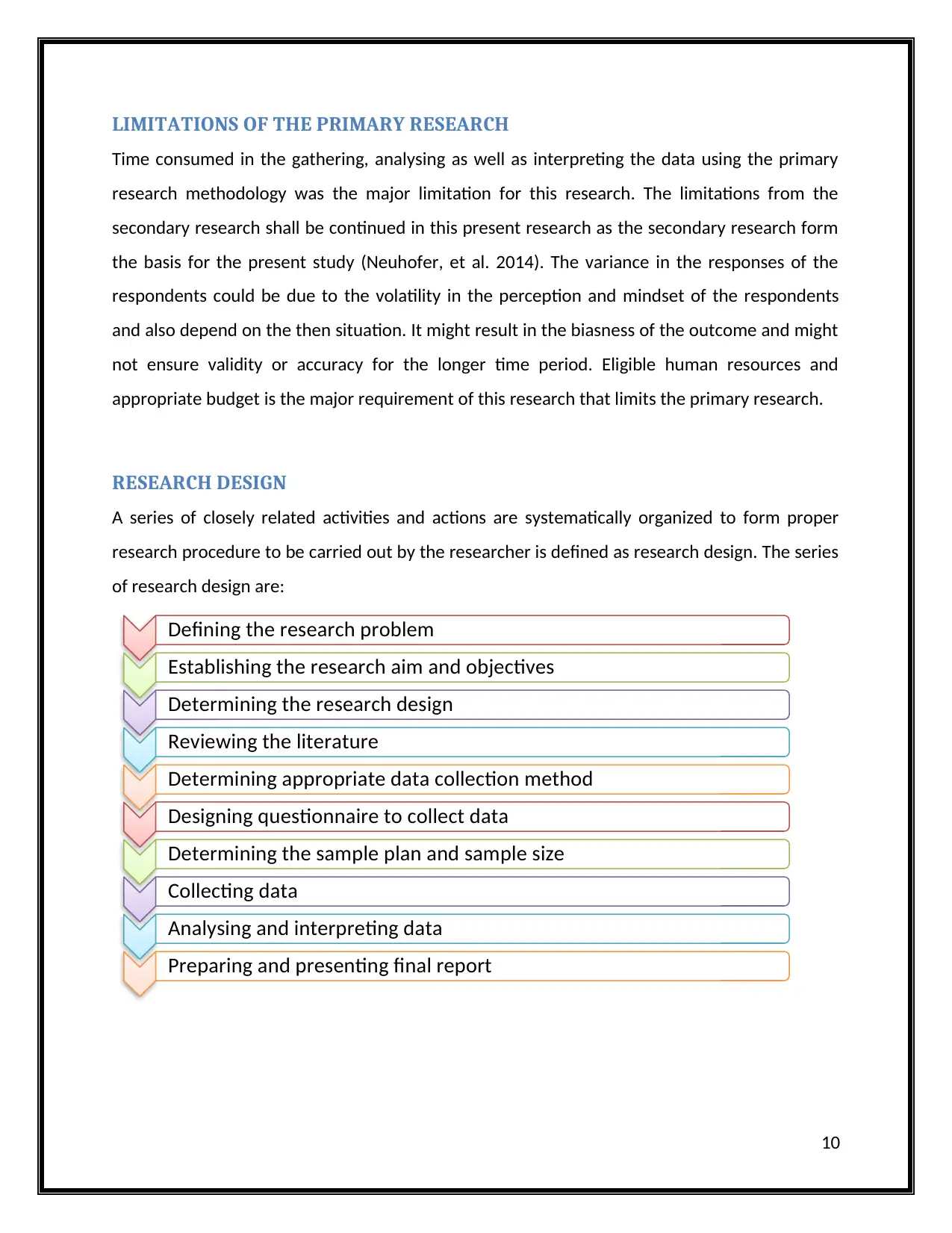
LIMITATIONS OF THE PRIMARY RESEARCH
Time consumed in the gathering, analysing as well as interpreting the data using the primary
research methodology was the major limitation for this research. The limitations from the
secondary research shall be continued in this present research as the secondary research form
the basis for the present study (Neuhofer, et al. 2014). The variance in the responses of the
respondents could be due to the volatility in the perception and mindset of the respondents
and also depend on the then situation. It might result in the biasness of the outcome and might
not ensure validity or accuracy for the longer time period. Eligible human resources and
appropriate budget is the major requirement of this research that limits the primary research.
RESEARCH DESIGN
A series of closely related activities and actions are systematically organized to form proper
research procedure to be carried out by the researcher is defined as research design. The series
of research design are:
10
Defining the research problem
Establishing the research aim and objectives
Determining the research design
Reviewing the literature
Determining appropriate data collection method
Designing questionnaire to collect data
Determining the sample plan and sample size
Collecting data
Analysing and interpreting data
Preparing and presenting final report
Time consumed in the gathering, analysing as well as interpreting the data using the primary
research methodology was the major limitation for this research. The limitations from the
secondary research shall be continued in this present research as the secondary research form
the basis for the present study (Neuhofer, et al. 2014). The variance in the responses of the
respondents could be due to the volatility in the perception and mindset of the respondents
and also depend on the then situation. It might result in the biasness of the outcome and might
not ensure validity or accuracy for the longer time period. Eligible human resources and
appropriate budget is the major requirement of this research that limits the primary research.
RESEARCH DESIGN
A series of closely related activities and actions are systematically organized to form proper
research procedure to be carried out by the researcher is defined as research design. The series
of research design are:
10
Defining the research problem
Establishing the research aim and objectives
Determining the research design
Reviewing the literature
Determining appropriate data collection method
Designing questionnaire to collect data
Determining the sample plan and sample size
Collecting data
Analysing and interpreting data
Preparing and presenting final report
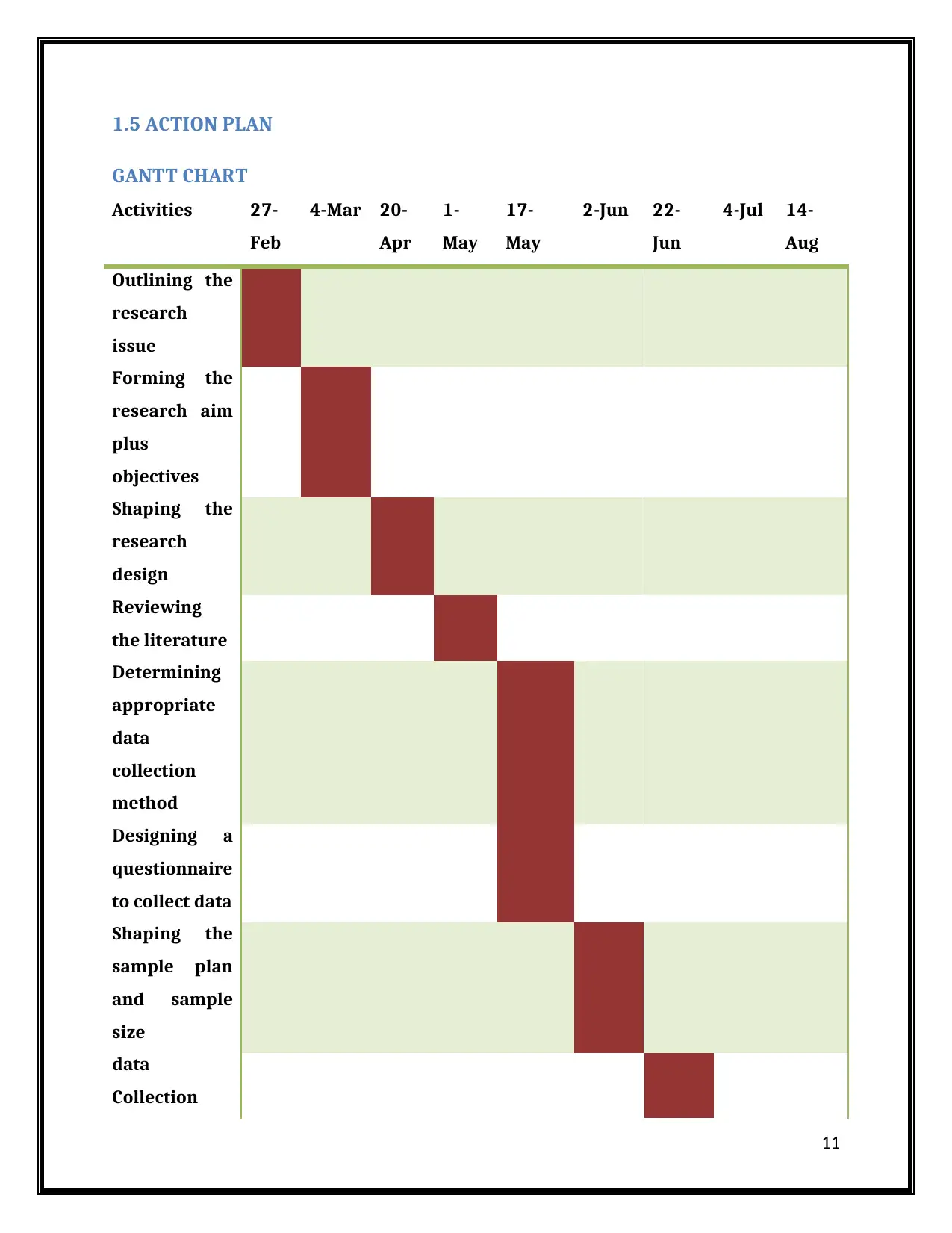
1.5 ACTION PLAN
GANTT CHART
Activities 27-
Feb
4-Mar 20-
Apr
1-
May
17-
May
2-Jun 22-
Jun
4-Jul 14-
Aug
Outlining the
research
issue
Forming the
research aim
plus
objectives
Shaping the
research
design
Reviewing
the literature
Determining
appropriate
data
collection
method
Designing a
questionnaire
to collect data
Shaping the
sample plan
and sample
size
data
Collection
11
GANTT CHART
Activities 27-
Feb
4-Mar 20-
Apr
1-
May
17-
May
2-Jun 22-
Jun
4-Jul 14-
Aug
Outlining the
research
issue
Forming the
research aim
plus
objectives
Shaping the
research
design
Reviewing
the literature
Determining
appropriate
data
collection
method
Designing a
questionnaire
to collect data
Shaping the
sample plan
and sample
size
data
Collection
11
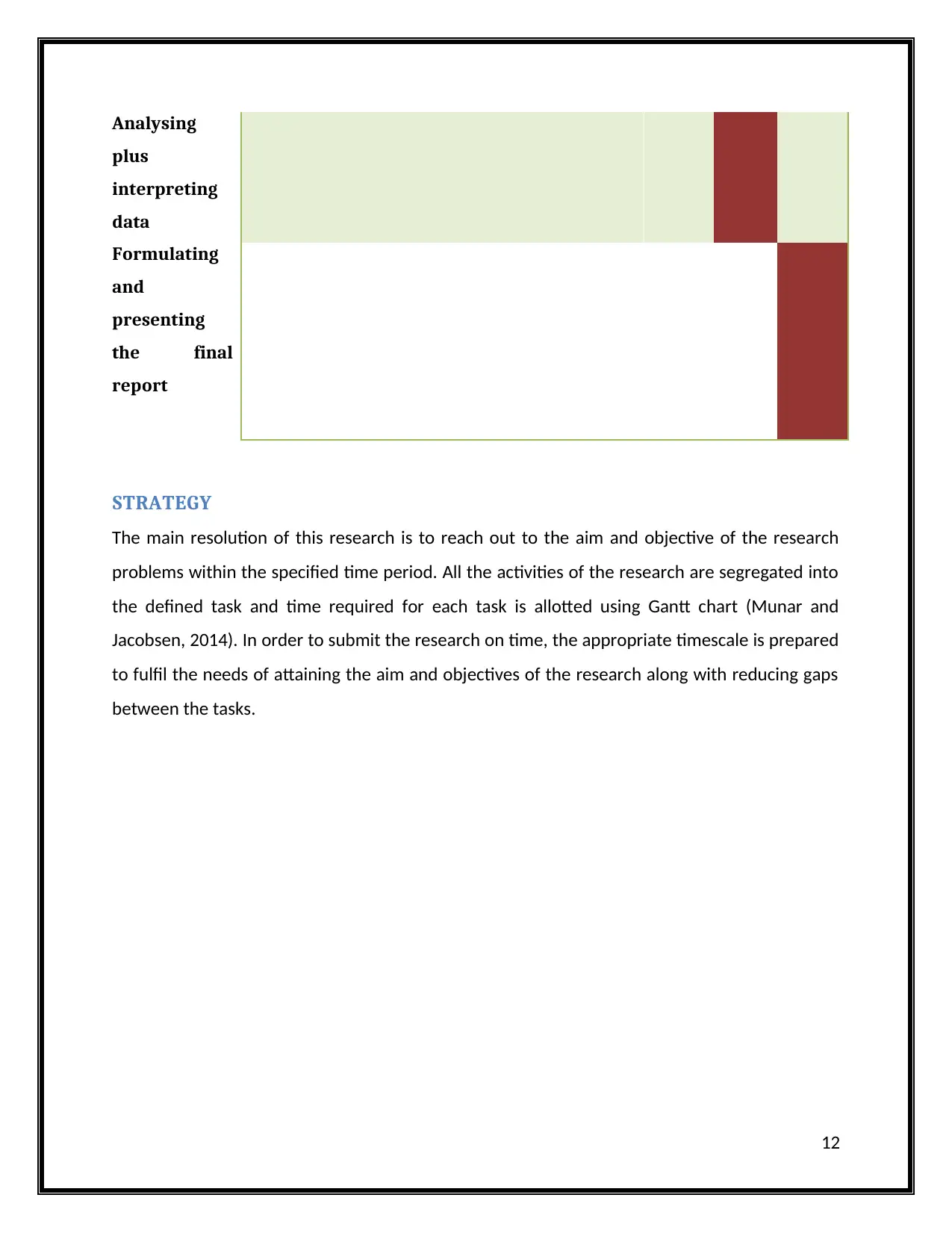
Analysing
plus
interpreting
data
Formulating
and
presenting
the final
report
STRATEGY
The main resolution of this research is to reach out to the aim and objective of the research
problems within the specified time period. All the activities of the research are segregated into
the defined task and time required for each task is allotted using Gantt chart (Munar and
Jacobsen, 2014). In order to submit the research on time, the appropriate timescale is prepared
to fulfil the needs of attaining the aim and objectives of the research along with reducing gaps
between the tasks.
12
plus
interpreting
data
Formulating
and
presenting
the final
report
STRATEGY
The main resolution of this research is to reach out to the aim and objective of the research
problems within the specified time period. All the activities of the research are segregated into
the defined task and time required for each task is allotted using Gantt chart (Munar and
Jacobsen, 2014). In order to submit the research on time, the appropriate timescale is prepared
to fulfil the needs of attaining the aim and objectives of the research along with reducing gaps
between the tasks.
12
Paraphrase This Document
Need a fresh take? Get an instant paraphrase of this document with our AI Paraphraser
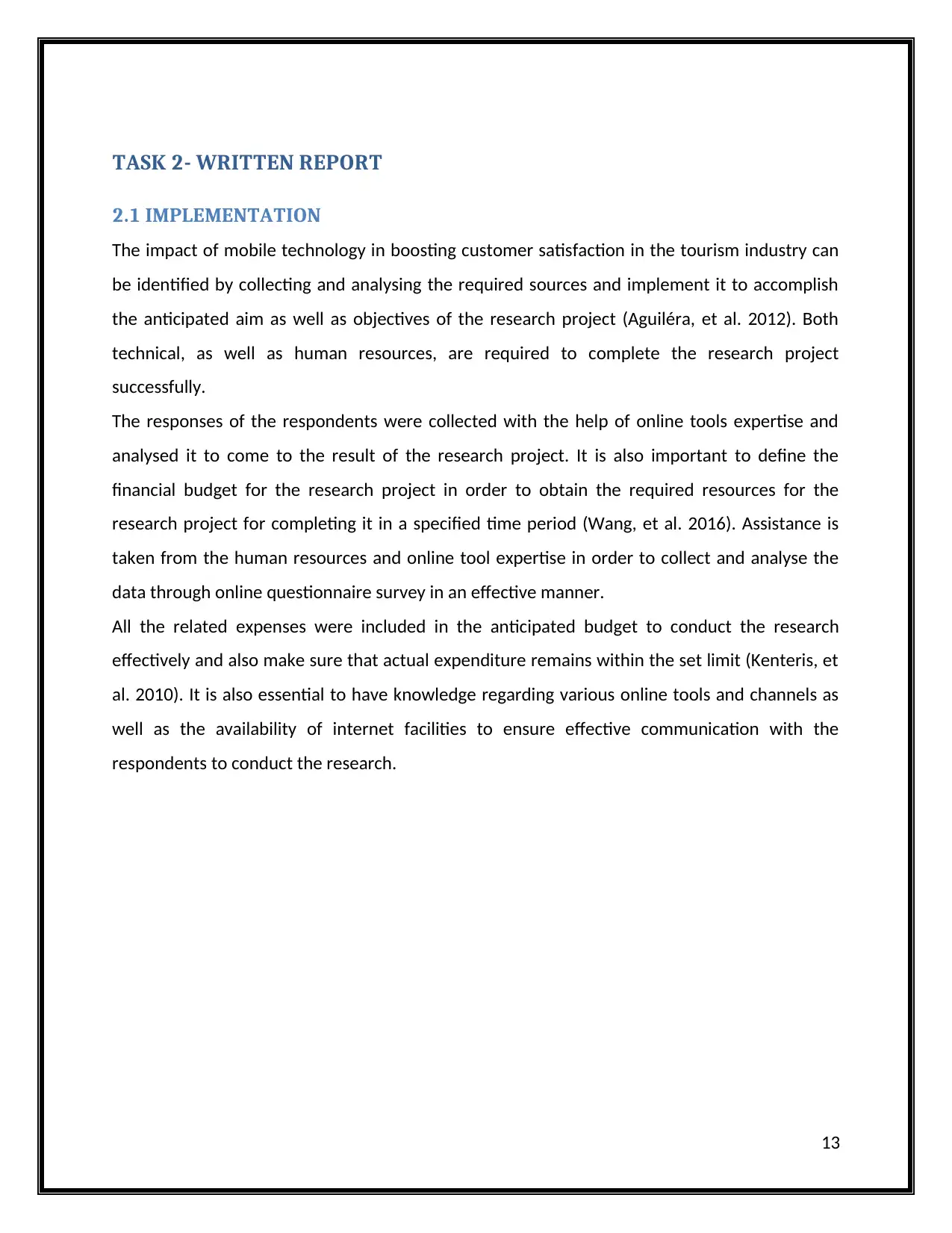
TASK 2- WRITTEN REPORT
2.1 IMPLEMENTATION
The impact of mobile technology in boosting customer satisfaction in the tourism industry can
be identified by collecting and analysing the required sources and implement it to accomplish
the anticipated aim as well as objectives of the research project (Aguiléra, et al. 2012). Both
technical, as well as human resources, are required to complete the research project
successfully.
The responses of the respondents were collected with the help of online tools expertise and
analysed it to come to the result of the research project. It is also important to define the
financial budget for the research project in order to obtain the required resources for the
research project for completing it in a specified time period (Wang, et al. 2016). Assistance is
taken from the human resources and online tool expertise in order to collect and analyse the
data through online questionnaire survey in an effective manner.
All the related expenses were included in the anticipated budget to conduct the research
effectively and also make sure that actual expenditure remains within the set limit (Kenteris, et
al. 2010). It is also essential to have knowledge regarding various online tools and channels as
well as the availability of internet facilities to ensure effective communication with the
respondents to conduct the research.
13
2.1 IMPLEMENTATION
The impact of mobile technology in boosting customer satisfaction in the tourism industry can
be identified by collecting and analysing the required sources and implement it to accomplish
the anticipated aim as well as objectives of the research project (Aguiléra, et al. 2012). Both
technical, as well as human resources, are required to complete the research project
successfully.
The responses of the respondents were collected with the help of online tools expertise and
analysed it to come to the result of the research project. It is also important to define the
financial budget for the research project in order to obtain the required resources for the
research project for completing it in a specified time period (Wang, et al. 2016). Assistance is
taken from the human resources and online tool expertise in order to collect and analyse the
data through online questionnaire survey in an effective manner.
All the related expenses were included in the anticipated budget to conduct the research
effectively and also make sure that actual expenditure remains within the set limit (Kenteris, et
al. 2010). It is also essential to have knowledge regarding various online tools and channels as
well as the availability of internet facilities to ensure effective communication with the
respondents to conduct the research.
13
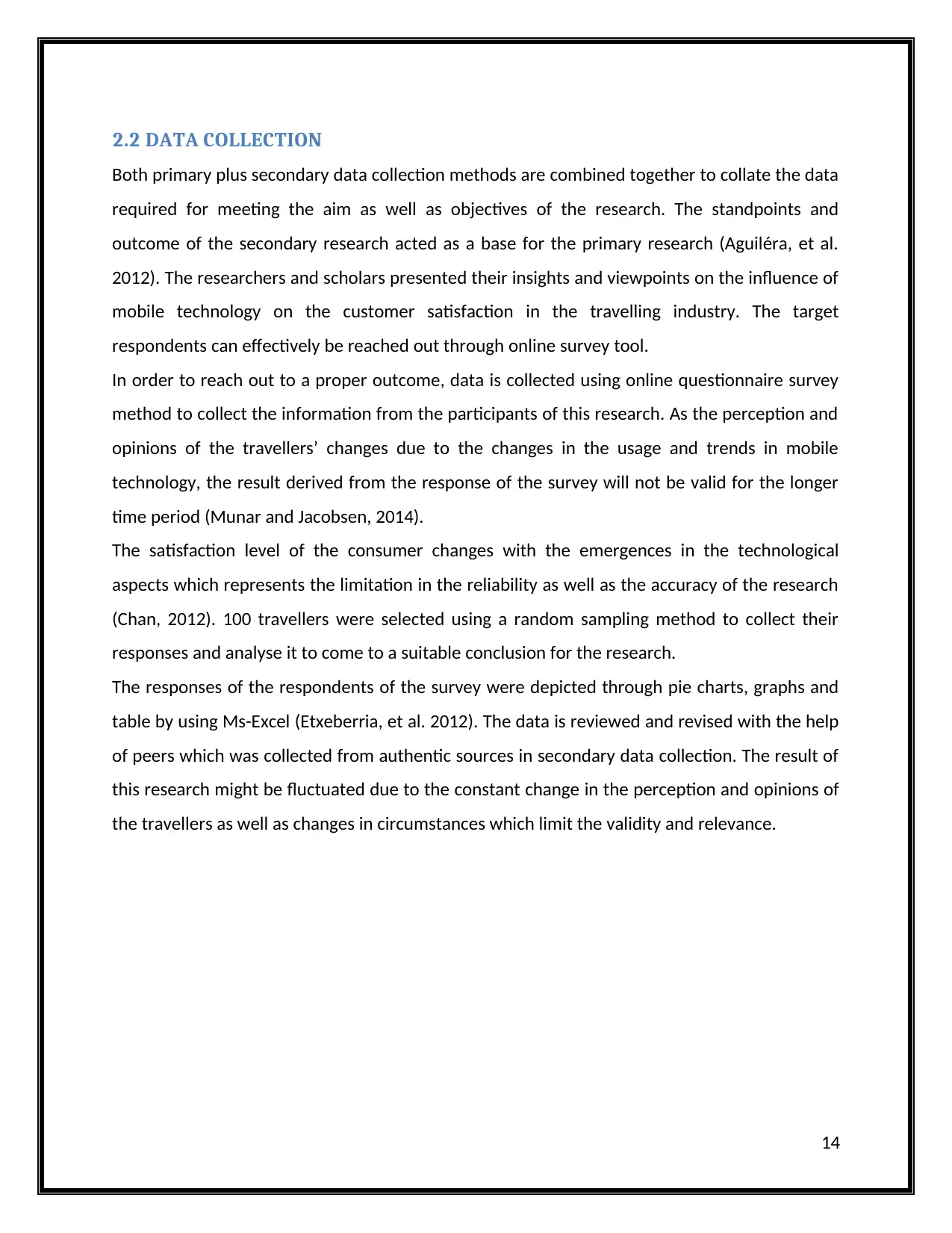
2.2 DATA COLLECTION
Both primary plus secondary data collection methods are combined together to collate the data
required for meeting the aim as well as objectives of the research. The standpoints and
outcome of the secondary research acted as a base for the primary research (Aguiléra, et al.
2012). The researchers and scholars presented their insights and viewpoints on the influence of
mobile technology on the customer satisfaction in the travelling industry. The target
respondents can effectively be reached out through online survey tool.
In order to reach out to a proper outcome, data is collected using online questionnaire survey
method to collect the information from the participants of this research. As the perception and
opinions of the travellers’ changes due to the changes in the usage and trends in mobile
technology, the result derived from the response of the survey will not be valid for the longer
time period (Munar and Jacobsen, 2014).
The satisfaction level of the consumer changes with the emergences in the technological
aspects which represents the limitation in the reliability as well as the accuracy of the research
(Chan, 2012). 100 travellers were selected using a random sampling method to collect their
responses and analyse it to come to a suitable conclusion for the research.
The responses of the respondents of the survey were depicted through pie charts, graphs and
table by using Ms-Excel (Etxeberria, et al. 2012). The data is reviewed and revised with the help
of peers which was collected from authentic sources in secondary data collection. The result of
this research might be fluctuated due to the constant change in the perception and opinions of
the travellers as well as changes in circumstances which limit the validity and relevance.
14
Both primary plus secondary data collection methods are combined together to collate the data
required for meeting the aim as well as objectives of the research. The standpoints and
outcome of the secondary research acted as a base for the primary research (Aguiléra, et al.
2012). The researchers and scholars presented their insights and viewpoints on the influence of
mobile technology on the customer satisfaction in the travelling industry. The target
respondents can effectively be reached out through online survey tool.
In order to reach out to a proper outcome, data is collected using online questionnaire survey
method to collect the information from the participants of this research. As the perception and
opinions of the travellers’ changes due to the changes in the usage and trends in mobile
technology, the result derived from the response of the survey will not be valid for the longer
time period (Munar and Jacobsen, 2014).
The satisfaction level of the consumer changes with the emergences in the technological
aspects which represents the limitation in the reliability as well as the accuracy of the research
(Chan, 2012). 100 travellers were selected using a random sampling method to collect their
responses and analyse it to come to a suitable conclusion for the research.
The responses of the respondents of the survey were depicted through pie charts, graphs and
table by using Ms-Excel (Etxeberria, et al. 2012). The data is reviewed and revised with the help
of peers which was collected from authentic sources in secondary data collection. The result of
this research might be fluctuated due to the constant change in the perception and opinions of
the travellers as well as changes in circumstances which limit the validity and relevance.
14
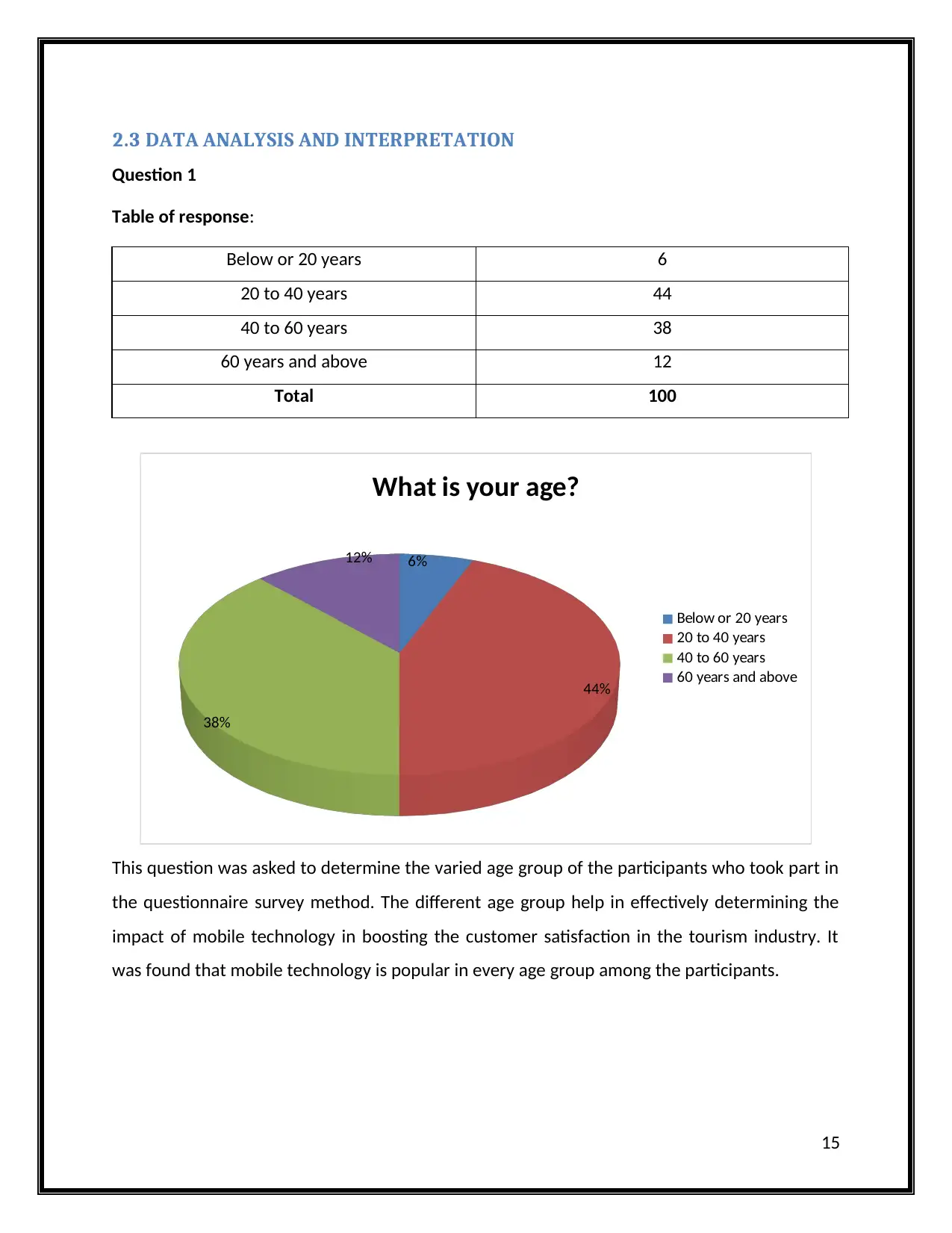
2.3 DATA ANALYSIS AND INTERPRETATION
Question 1
Table of response:
Below or 20 years 6
20 to 40 years 44
40 to 60 years 38
60 years and above 12
Total 100
6%
44%
38%
12%
What is your age?
Below or 20 years
20 to 40 years
40 to 60 years
60 years and above
This question was asked to determine the varied age group of the participants who took part in
the questionnaire survey method. The different age group help in effectively determining the
impact of mobile technology in boosting the customer satisfaction in the tourism industry. It
was found that mobile technology is popular in every age group among the participants.
15
Question 1
Table of response:
Below or 20 years 6
20 to 40 years 44
40 to 60 years 38
60 years and above 12
Total 100
6%
44%
38%
12%
What is your age?
Below or 20 years
20 to 40 years
40 to 60 years
60 years and above
This question was asked to determine the varied age group of the participants who took part in
the questionnaire survey method. The different age group help in effectively determining the
impact of mobile technology in boosting the customer satisfaction in the tourism industry. It
was found that mobile technology is popular in every age group among the participants.
15
Secure Best Marks with AI Grader
Need help grading? Try our AI Grader for instant feedback on your assignments.
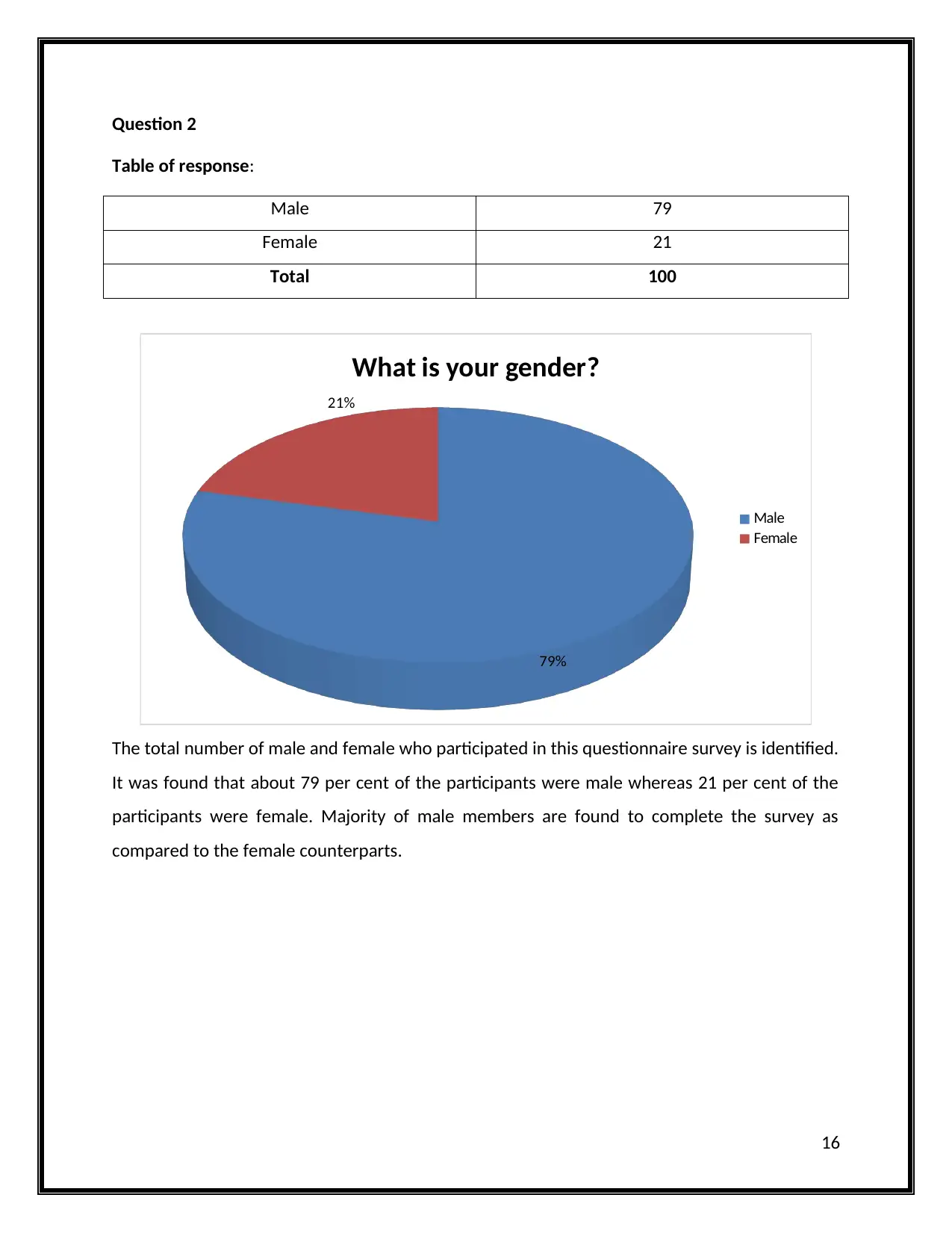
Question 2
Table of response:
Male 79
Female 21
Total 100
79%
21%
What is your gender?
Male
Female
The total number of male and female who participated in this questionnaire survey is identified.
It was found that about 79 per cent of the participants were male whereas 21 per cent of the
participants were female. Majority of male members are found to complete the survey as
compared to the female counterparts.
16
Table of response:
Male 79
Female 21
Total 100
79%
21%
What is your gender?
Male
Female
The total number of male and female who participated in this questionnaire survey is identified.
It was found that about 79 per cent of the participants were male whereas 21 per cent of the
participants were female. Majority of male members are found to complete the survey as
compared to the female counterparts.
16
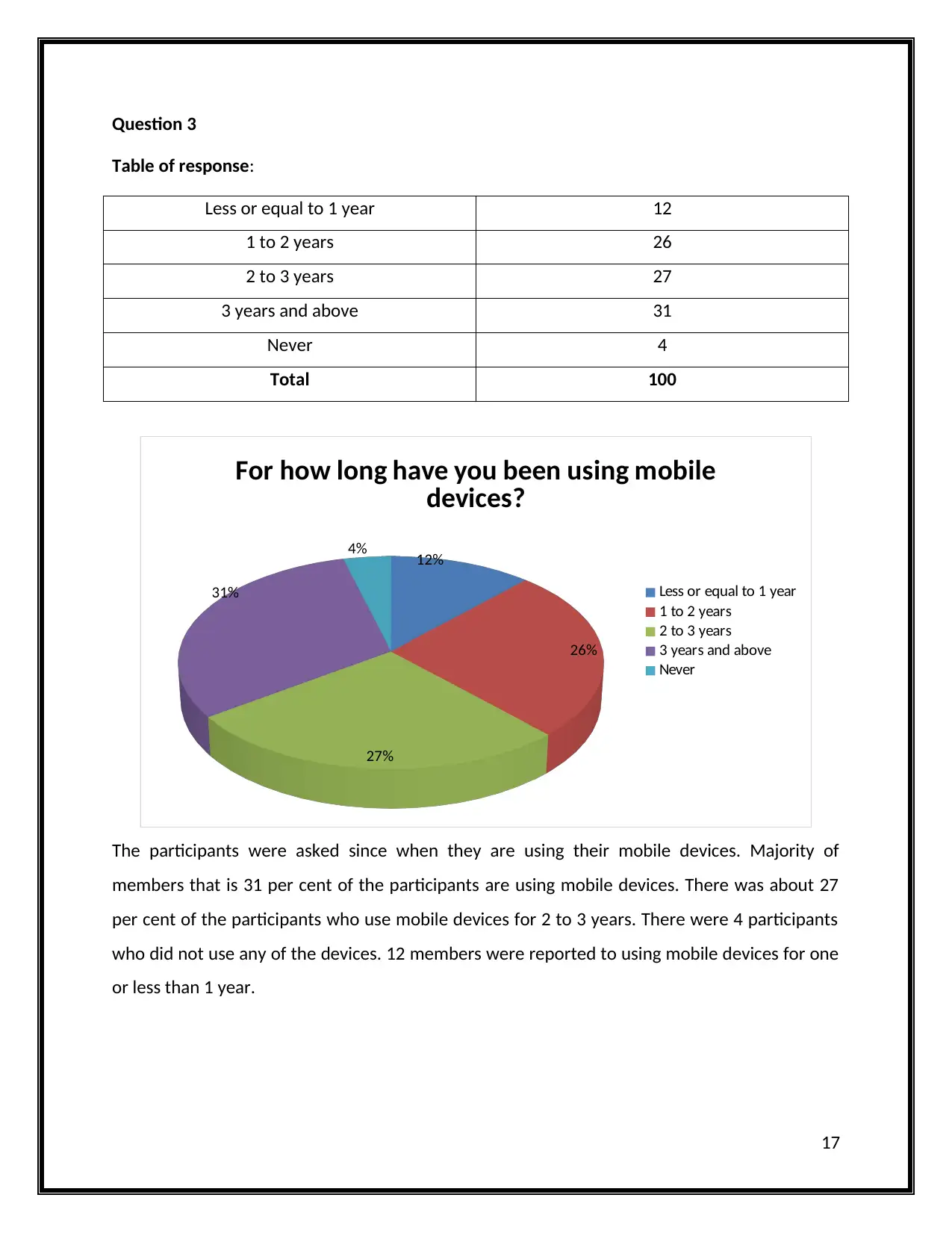
Question 3
Table of response:
Less or equal to 1 year 12
1 to 2 years 26
2 to 3 years 27
3 years and above 31
Never 4
Total 100
12%
26%
27%
31%
4%
For how long have you been using mobile
devices?
Less or equal to 1 year
1 to 2 years
2 to 3 years
3 years and above
Never
The participants were asked since when they are using their mobile devices. Majority of
members that is 31 per cent of the participants are using mobile devices. There was about 27
per cent of the participants who use mobile devices for 2 to 3 years. There were 4 participants
who did not use any of the devices. 12 members were reported to using mobile devices for one
or less than 1 year.
17
Table of response:
Less or equal to 1 year 12
1 to 2 years 26
2 to 3 years 27
3 years and above 31
Never 4
Total 100
12%
26%
27%
31%
4%
For how long have you been using mobile
devices?
Less or equal to 1 year
1 to 2 years
2 to 3 years
3 years and above
Never
The participants were asked since when they are using their mobile devices. Majority of
members that is 31 per cent of the participants are using mobile devices. There was about 27
per cent of the participants who use mobile devices for 2 to 3 years. There were 4 participants
who did not use any of the devices. 12 members were reported to using mobile devices for one
or less than 1 year.
17
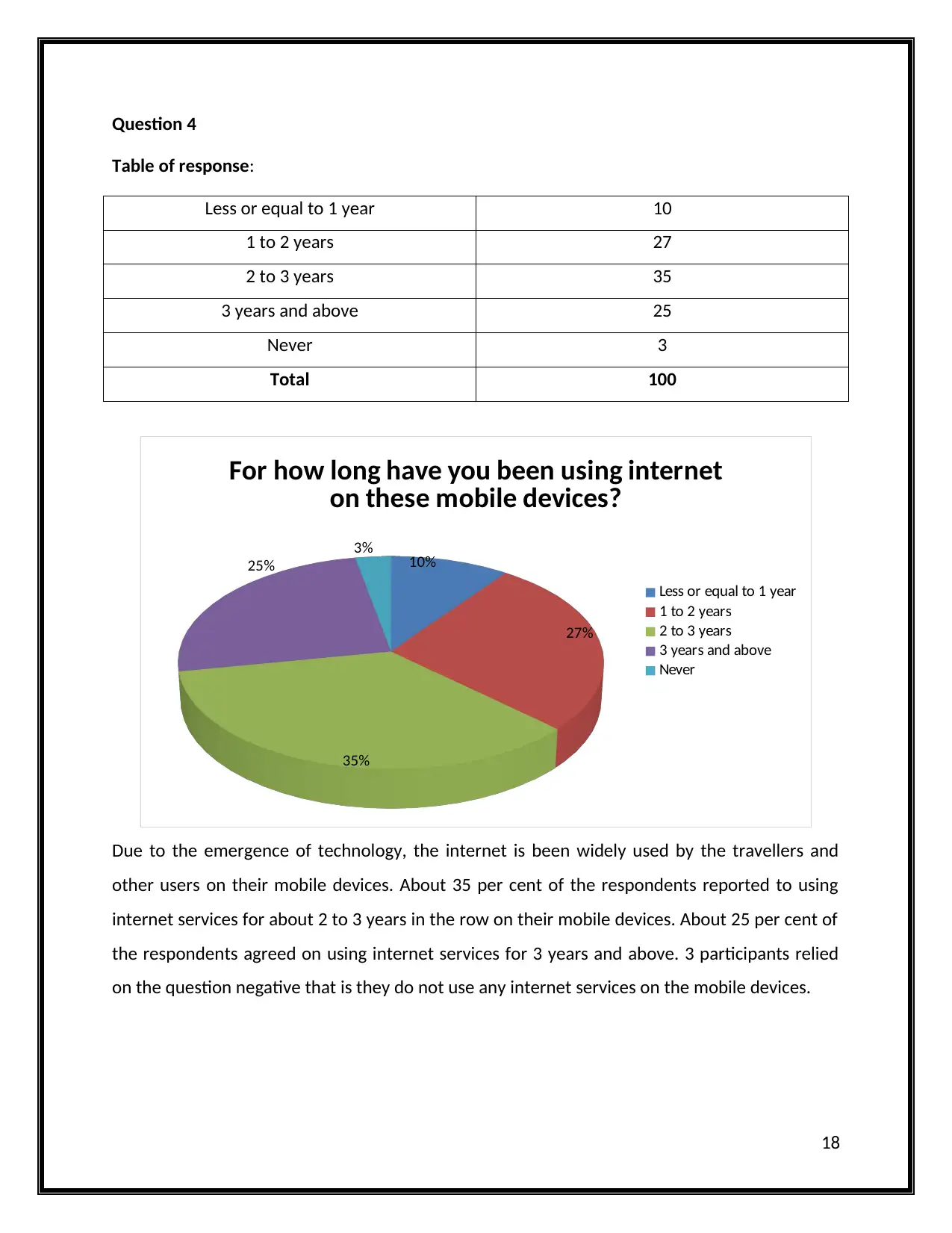
Question 4
Table of response:
Less or equal to 1 year 10
1 to 2 years 27
2 to 3 years 35
3 years and above 25
Never 3
Total 100
10%
27%
35%
25%
3%
For how long have you been using internet
on these mobile devices?
Less or equal to 1 year
1 to 2 years
2 to 3 years
3 years and above
Never
Due to the emergence of technology, the internet is been widely used by the travellers and
other users on their mobile devices. About 35 per cent of the respondents reported to using
internet services for about 2 to 3 years in the row on their mobile devices. About 25 per cent of
the respondents agreed on using internet services for 3 years and above. 3 participants relied
on the question negative that is they do not use any internet services on the mobile devices.
18
Table of response:
Less or equal to 1 year 10
1 to 2 years 27
2 to 3 years 35
3 years and above 25
Never 3
Total 100
10%
27%
35%
25%
3%
For how long have you been using internet
on these mobile devices?
Less or equal to 1 year
1 to 2 years
2 to 3 years
3 years and above
Never
Due to the emergence of technology, the internet is been widely used by the travellers and
other users on their mobile devices. About 35 per cent of the respondents reported to using
internet services for about 2 to 3 years in the row on their mobile devices. About 25 per cent of
the respondents agreed on using internet services for 3 years and above. 3 participants relied
on the question negative that is they do not use any internet services on the mobile devices.
18
Paraphrase This Document
Need a fresh take? Get an instant paraphrase of this document with our AI Paraphraser
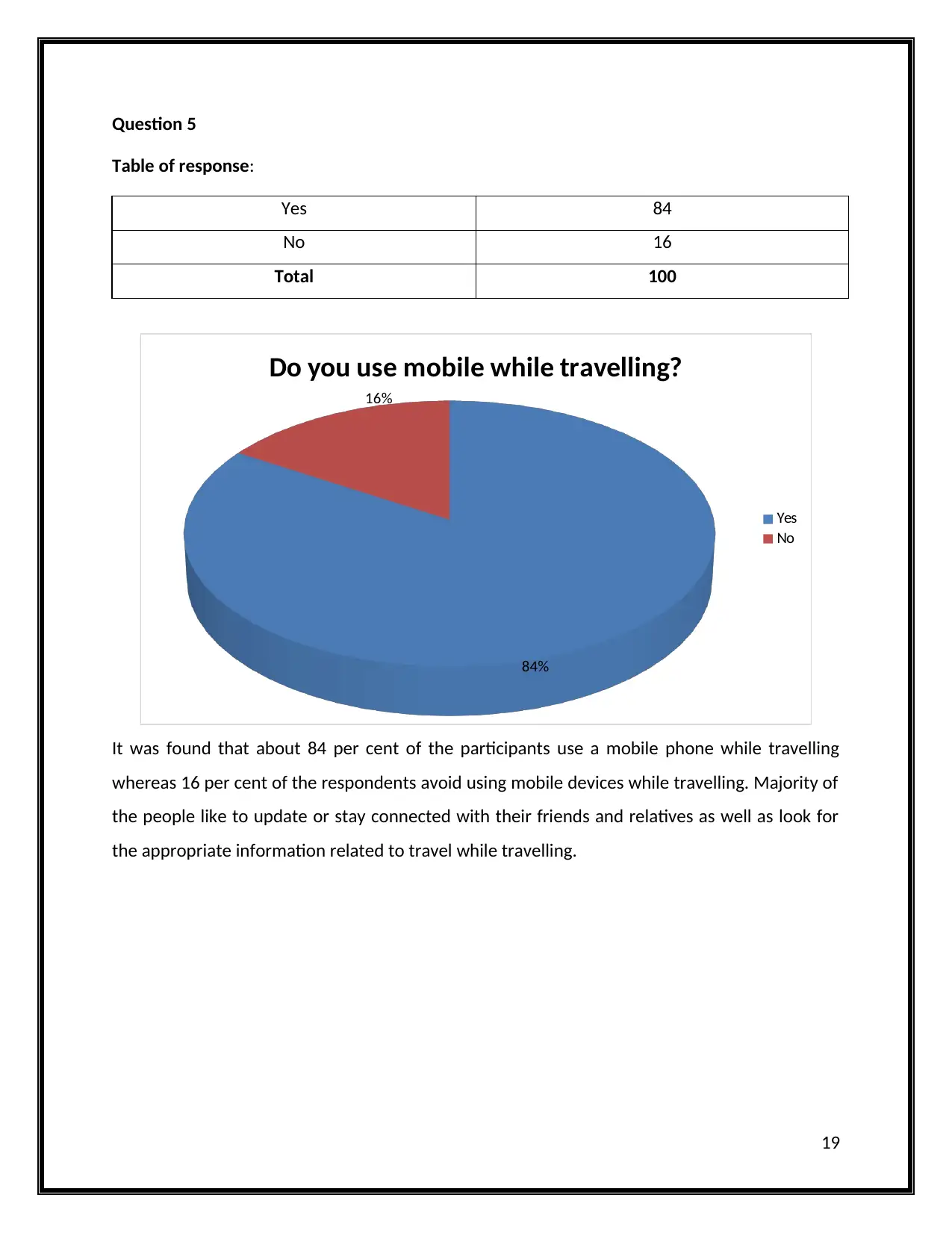
Question 5
Table of response:
Yes 84
No 16
Total 100
84%
16%
Do you use mobile while travelling?
Yes
No
It was found that about 84 per cent of the participants use a mobile phone while travelling
whereas 16 per cent of the respondents avoid using mobile devices while travelling. Majority of
the people like to update or stay connected with their friends and relatives as well as look for
the appropriate information related to travel while travelling.
19
Table of response:
Yes 84
No 16
Total 100
84%
16%
Do you use mobile while travelling?
Yes
No
It was found that about 84 per cent of the participants use a mobile phone while travelling
whereas 16 per cent of the respondents avoid using mobile devices while travelling. Majority of
the people like to update or stay connected with their friends and relatives as well as look for
the appropriate information related to travel while travelling.
19
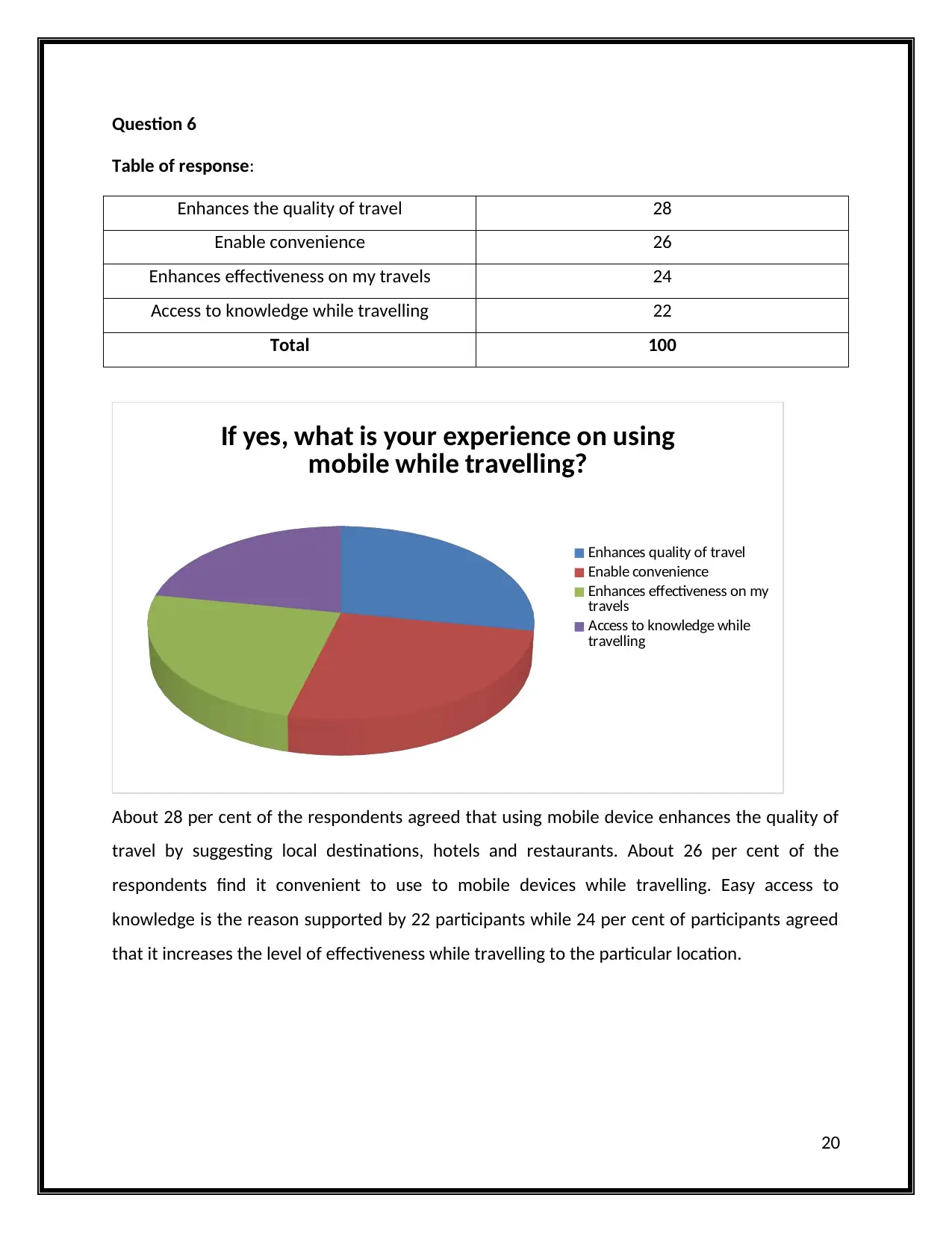
Question 6
Table of response:
Enhances the quality of travel 28
Enable convenience 26
Enhances effectiveness on my travels 24
Access to knowledge while travelling 22
Total 100
If yes, what is your experience on using
mobile while travelling?
Enhances quality of travel
Enable convenience
Enhances effectiveness on my
travels
Access to knowledge while
travelling
About 28 per cent of the respondents agreed that using mobile device enhances the quality of
travel by suggesting local destinations, hotels and restaurants. About 26 per cent of the
respondents find it convenient to use to mobile devices while travelling. Easy access to
knowledge is the reason supported by 22 participants while 24 per cent of participants agreed
that it increases the level of effectiveness while travelling to the particular location.
20
Table of response:
Enhances the quality of travel 28
Enable convenience 26
Enhances effectiveness on my travels 24
Access to knowledge while travelling 22
Total 100
If yes, what is your experience on using
mobile while travelling?
Enhances quality of travel
Enable convenience
Enhances effectiveness on my
travels
Access to knowledge while
travelling
About 28 per cent of the respondents agreed that using mobile device enhances the quality of
travel by suggesting local destinations, hotels and restaurants. About 26 per cent of the
respondents find it convenient to use to mobile devices while travelling. Easy access to
knowledge is the reason supported by 22 participants while 24 per cent of participants agreed
that it increases the level of effectiveness while travelling to the particular location.
20
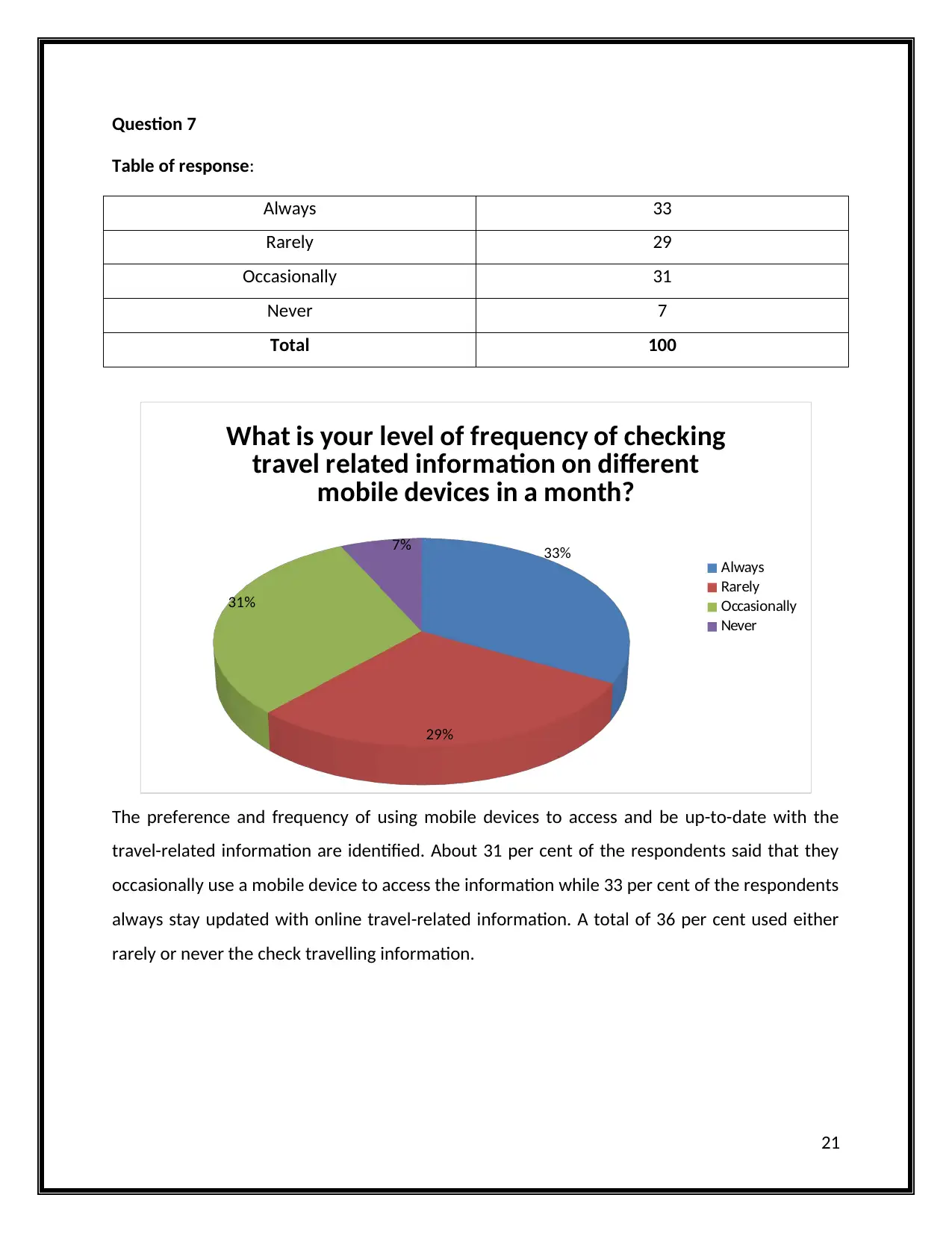
Question 7
Table of response:
Always 33
Rarely 29
Occasionally 31
Never 7
Total 100
33%
29%
31%
7%
What is your level of frequency of checking
travel related information on different
mobile devices in a month?
Always
Rarely
Occasionally
Never
The preference and frequency of using mobile devices to access and be up-to-date with the
travel-related information are identified. About 31 per cent of the respondents said that they
occasionally use a mobile device to access the information while 33 per cent of the respondents
always stay updated with online travel-related information. A total of 36 per cent used either
rarely or never the check travelling information.
21
Table of response:
Always 33
Rarely 29
Occasionally 31
Never 7
Total 100
33%
29%
31%
7%
What is your level of frequency of checking
travel related information on different
mobile devices in a month?
Always
Rarely
Occasionally
Never
The preference and frequency of using mobile devices to access and be up-to-date with the
travel-related information are identified. About 31 per cent of the respondents said that they
occasionally use a mobile device to access the information while 33 per cent of the respondents
always stay updated with online travel-related information. A total of 36 per cent used either
rarely or never the check travelling information.
21
Secure Best Marks with AI Grader
Need help grading? Try our AI Grader for instant feedback on your assignments.
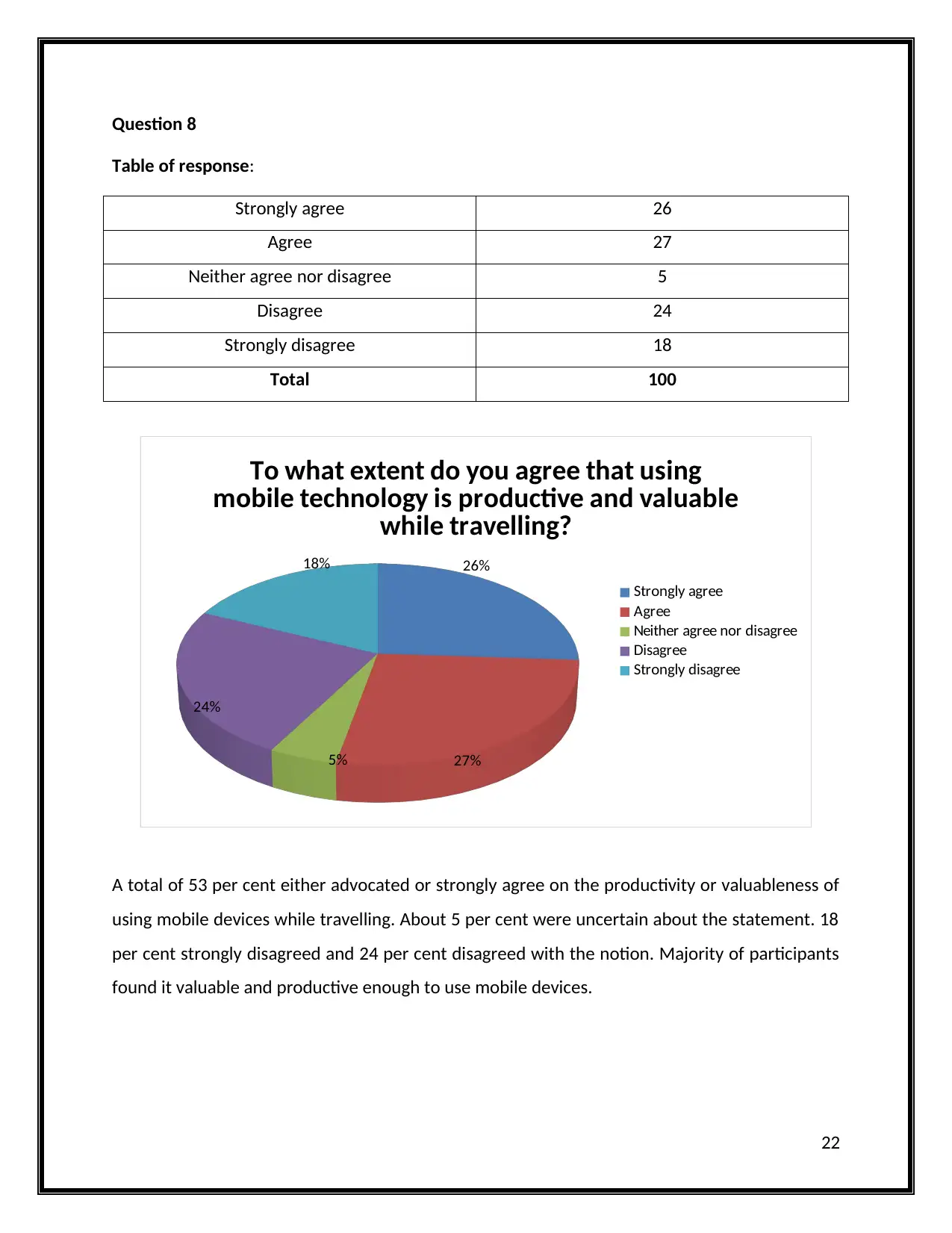
Question 8
Table of response:
Strongly agree 26
Agree 27
Neither agree nor disagree 5
Disagree 24
Strongly disagree 18
Total 100
26%
27%5%
24%
18%
To what extent do you agree that using
mobile technology is productive and valuable
while travelling?
Strongly agree
Agree
Neither agree nor disagree
Disagree
Strongly disagree
A total of 53 per cent either advocated or strongly agree on the productivity or valuableness of
using mobile devices while travelling. About 5 per cent were uncertain about the statement. 18
per cent strongly disagreed and 24 per cent disagreed with the notion. Majority of participants
found it valuable and productive enough to use mobile devices.
22
Table of response:
Strongly agree 26
Agree 27
Neither agree nor disagree 5
Disagree 24
Strongly disagree 18
Total 100
26%
27%5%
24%
18%
To what extent do you agree that using
mobile technology is productive and valuable
while travelling?
Strongly agree
Agree
Neither agree nor disagree
Disagree
Strongly disagree
A total of 53 per cent either advocated or strongly agree on the productivity or valuableness of
using mobile devices while travelling. About 5 per cent were uncertain about the statement. 18
per cent strongly disagreed and 24 per cent disagreed with the notion. Majority of participants
found it valuable and productive enough to use mobile devices.
22
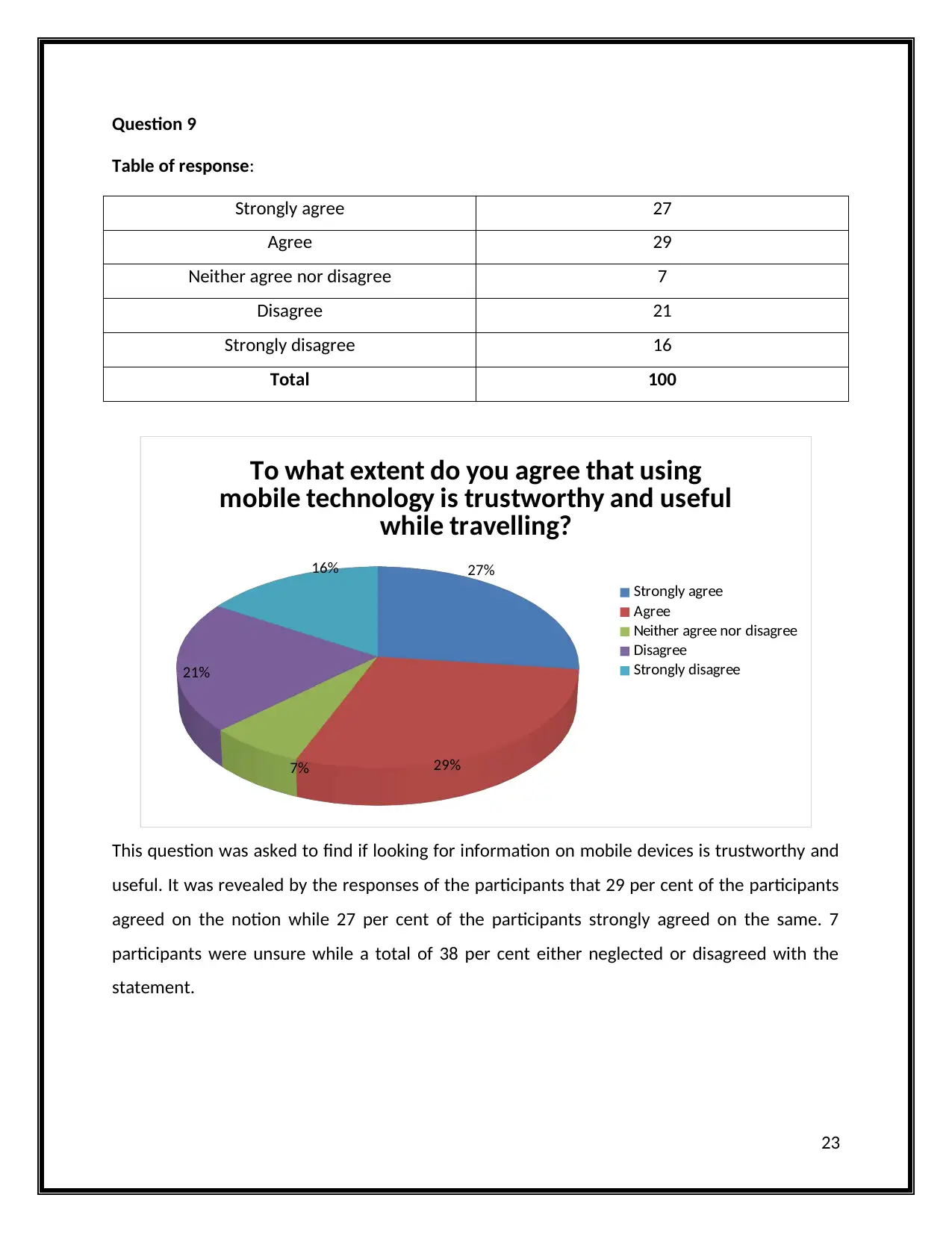
Question 9
Table of response:
Strongly agree 27
Agree 29
Neither agree nor disagree 7
Disagree 21
Strongly disagree 16
Total 100
27%
29%7%
21%
16%
To what extent do you agree that using
mobile technology is trustworthy and useful
while travelling?
Strongly agree
Agree
Neither agree nor disagree
Disagree
Strongly disagree
This question was asked to find if looking for information on mobile devices is trustworthy and
useful. It was revealed by the responses of the participants that 29 per cent of the participants
agreed on the notion while 27 per cent of the participants strongly agreed on the same. 7
participants were unsure while a total of 38 per cent either neglected or disagreed with the
statement.
23
Table of response:
Strongly agree 27
Agree 29
Neither agree nor disagree 7
Disagree 21
Strongly disagree 16
Total 100
27%
29%7%
21%
16%
To what extent do you agree that using
mobile technology is trustworthy and useful
while travelling?
Strongly agree
Agree
Neither agree nor disagree
Disagree
Strongly disagree
This question was asked to find if looking for information on mobile devices is trustworthy and
useful. It was revealed by the responses of the participants that 29 per cent of the participants
agreed on the notion while 27 per cent of the participants strongly agreed on the same. 7
participants were unsure while a total of 38 per cent either neglected or disagreed with the
statement.
23
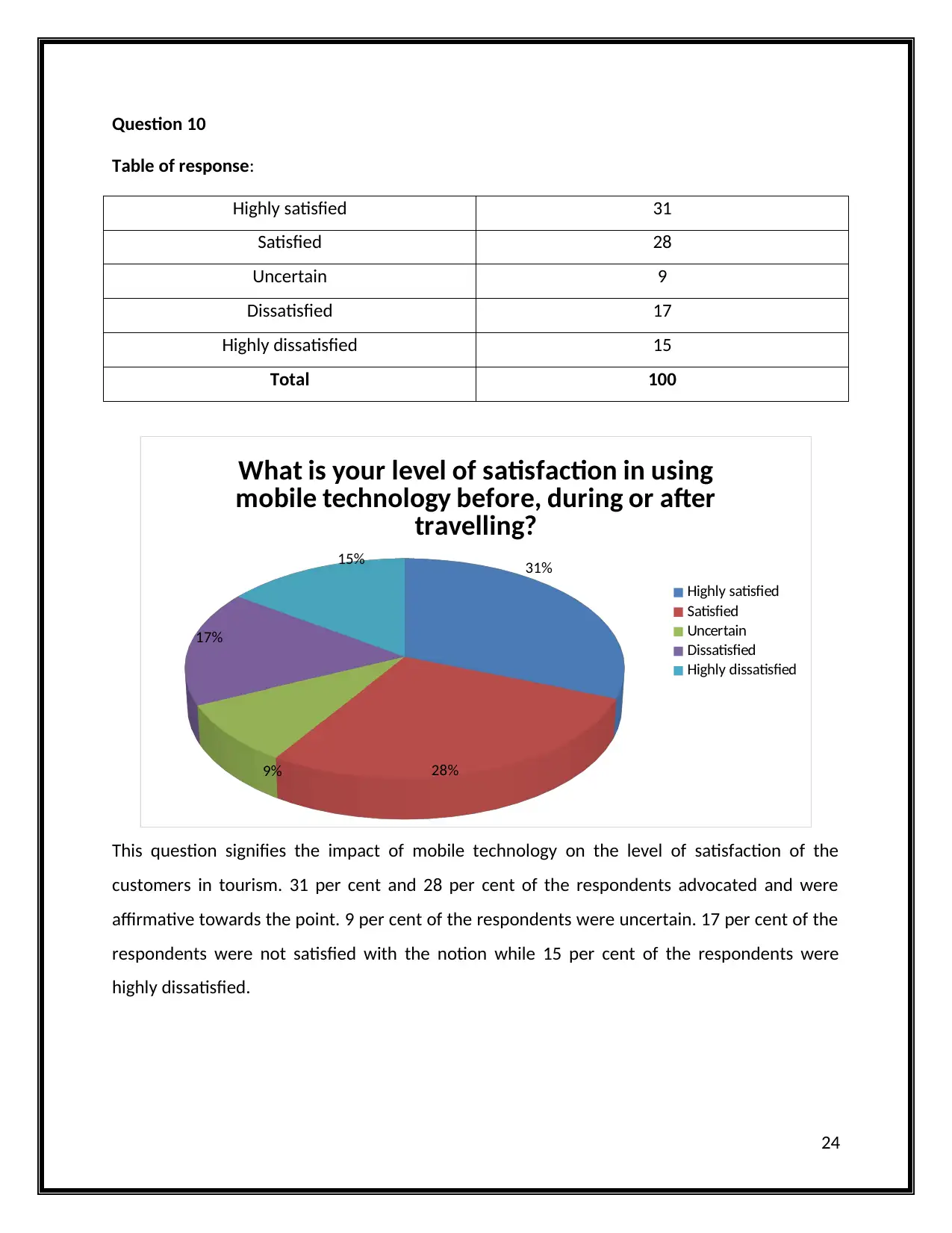
Question 10
Table of response:
Highly satisfied 31
Satisfied 28
Uncertain 9
Dissatisfied 17
Highly dissatisfied 15
Total 100
31%
28%9%
17%
15%
What is your level of satisfaction in using
mobile technology before, during or after
travelling?
Highly satisfied
Satisfied
Uncertain
Dissatisfied
Highly dissatisfied
This question signifies the impact of mobile technology on the level of satisfaction of the
customers in tourism. 31 per cent and 28 per cent of the respondents advocated and were
affirmative towards the point. 9 per cent of the respondents were uncertain. 17 per cent of the
respondents were not satisfied with the notion while 15 per cent of the respondents were
highly dissatisfied.
24
Table of response:
Highly satisfied 31
Satisfied 28
Uncertain 9
Dissatisfied 17
Highly dissatisfied 15
Total 100
31%
28%9%
17%
15%
What is your level of satisfaction in using
mobile technology before, during or after
travelling?
Highly satisfied
Satisfied
Uncertain
Dissatisfied
Highly dissatisfied
This question signifies the impact of mobile technology on the level of satisfaction of the
customers in tourism. 31 per cent and 28 per cent of the respondents advocated and were
affirmative towards the point. 9 per cent of the respondents were uncertain. 17 per cent of the
respondents were not satisfied with the notion while 15 per cent of the respondents were
highly dissatisfied.
24
Paraphrase This Document
Need a fresh take? Get an instant paraphrase of this document with our AI Paraphraser
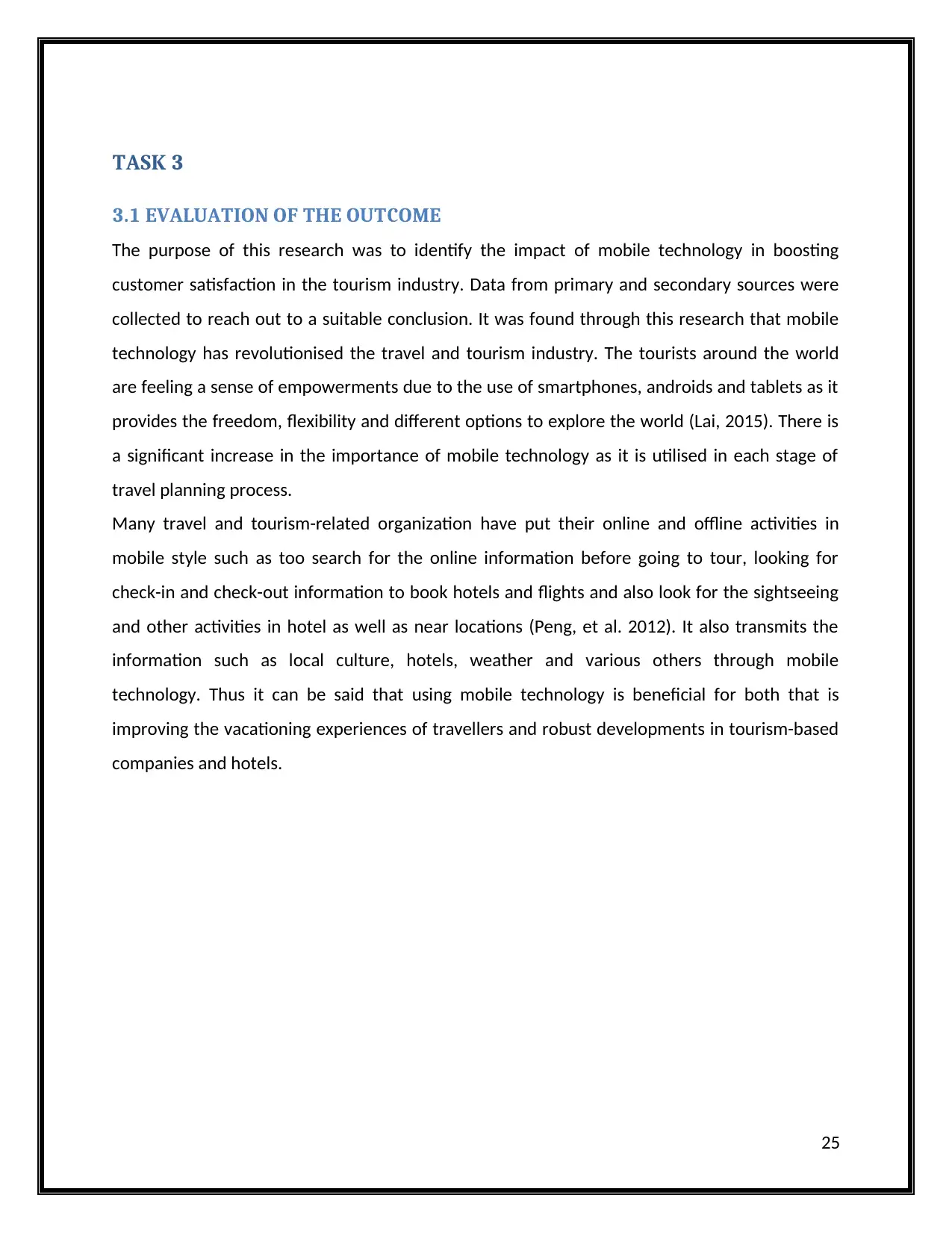
TASK 3
3.1 EVALUATION OF THE OUTCOME
The purpose of this research was to identify the impact of mobile technology in boosting
customer satisfaction in the tourism industry. Data from primary and secondary sources were
collected to reach out to a suitable conclusion. It was found through this research that mobile
technology has revolutionised the travel and tourism industry. The tourists around the world
are feeling a sense of empowerments due to the use of smartphones, androids and tablets as it
provides the freedom, flexibility and different options to explore the world (Lai, 2015). There is
a significant increase in the importance of mobile technology as it is utilised in each stage of
travel planning process.
Many travel and tourism-related organization have put their online and offline activities in
mobile style such as too search for the online information before going to tour, looking for
check-in and check-out information to book hotels and flights and also look for the sightseeing
and other activities in hotel as well as near locations (Peng, et al. 2012). It also transmits the
information such as local culture, hotels, weather and various others through mobile
technology. Thus it can be said that using mobile technology is beneficial for both that is
improving the vacationing experiences of travellers and robust developments in tourism-based
companies and hotels.
25
3.1 EVALUATION OF THE OUTCOME
The purpose of this research was to identify the impact of mobile technology in boosting
customer satisfaction in the tourism industry. Data from primary and secondary sources were
collected to reach out to a suitable conclusion. It was found through this research that mobile
technology has revolutionised the travel and tourism industry. The tourists around the world
are feeling a sense of empowerments due to the use of smartphones, androids and tablets as it
provides the freedom, flexibility and different options to explore the world (Lai, 2015). There is
a significant increase in the importance of mobile technology as it is utilised in each stage of
travel planning process.
Many travel and tourism-related organization have put their online and offline activities in
mobile style such as too search for the online information before going to tour, looking for
check-in and check-out information to book hotels and flights and also look for the sightseeing
and other activities in hotel as well as near locations (Peng, et al. 2012). It also transmits the
information such as local culture, hotels, weather and various others through mobile
technology. Thus it can be said that using mobile technology is beneficial for both that is
improving the vacationing experiences of travellers and robust developments in tourism-based
companies and hotels.
25
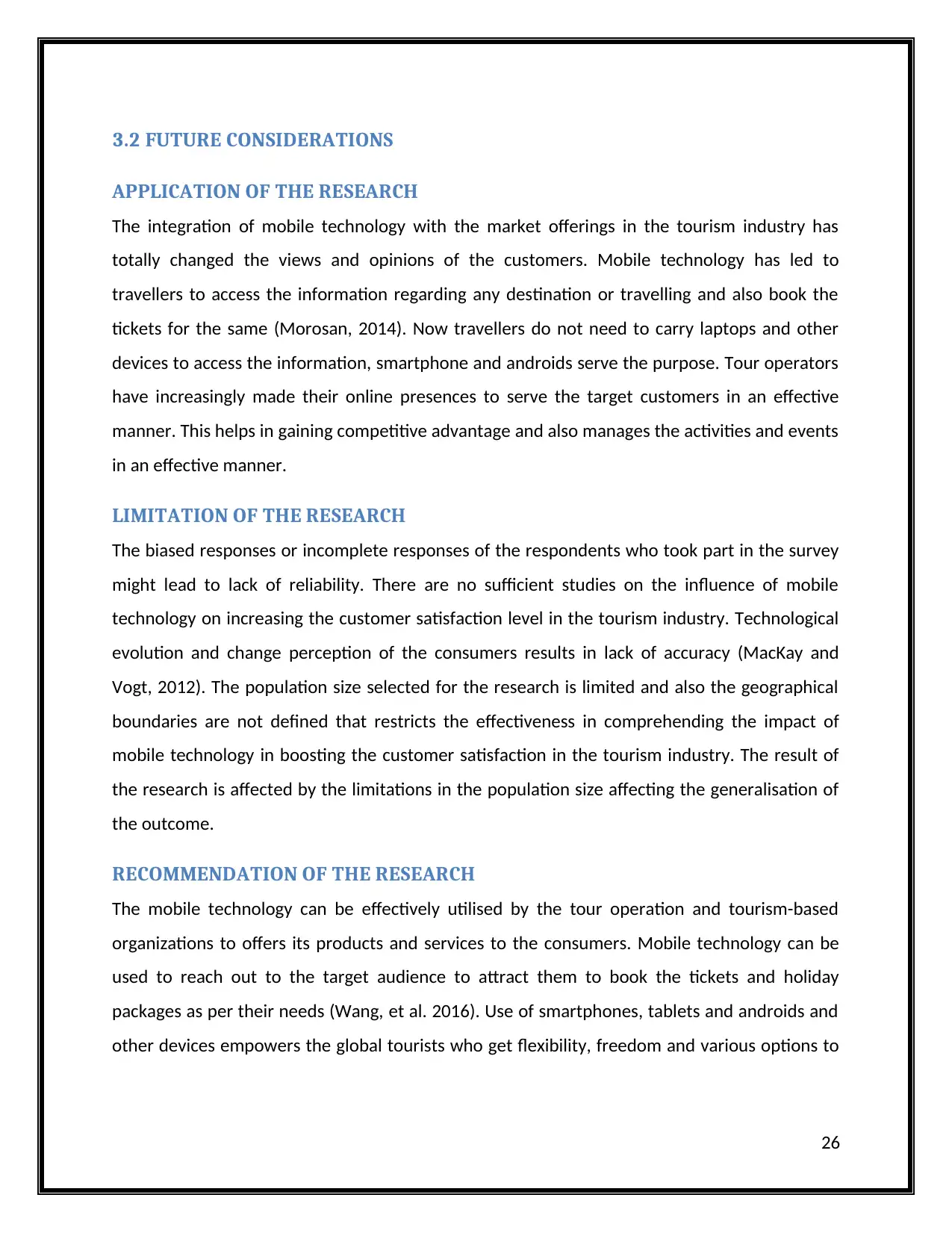
3.2 FUTURE CONSIDERATIONS
APPLICATION OF THE RESEARCH
The integration of mobile technology with the market offerings in the tourism industry has
totally changed the views and opinions of the customers. Mobile technology has led to
travellers to access the information regarding any destination or travelling and also book the
tickets for the same (Morosan, 2014). Now travellers do not need to carry laptops and other
devices to access the information, smartphone and androids serve the purpose. Tour operators
have increasingly made their online presences to serve the target customers in an effective
manner. This helps in gaining competitive advantage and also manages the activities and events
in an effective manner.
LIMITATION OF THE RESEARCH
The biased responses or incomplete responses of the respondents who took part in the survey
might lead to lack of reliability. There are no sufficient studies on the influence of mobile
technology on increasing the customer satisfaction level in the tourism industry. Technological
evolution and change perception of the consumers results in lack of accuracy (MacKay and
Vogt, 2012). The population size selected for the research is limited and also the geographical
boundaries are not defined that restricts the effectiveness in comprehending the impact of
mobile technology in boosting the customer satisfaction in the tourism industry. The result of
the research is affected by the limitations in the population size affecting the generalisation of
the outcome.
RECOMMENDATION OF THE RESEARCH
The mobile technology can be effectively utilised by the tour operation and tourism-based
organizations to offers its products and services to the consumers. Mobile technology can be
used to reach out to the target audience to attract them to book the tickets and holiday
packages as per their needs (Wang, et al. 2016). Use of smartphones, tablets and androids and
other devices empowers the global tourists who get flexibility, freedom and various options to
26
APPLICATION OF THE RESEARCH
The integration of mobile technology with the market offerings in the tourism industry has
totally changed the views and opinions of the customers. Mobile technology has led to
travellers to access the information regarding any destination or travelling and also book the
tickets for the same (Morosan, 2014). Now travellers do not need to carry laptops and other
devices to access the information, smartphone and androids serve the purpose. Tour operators
have increasingly made their online presences to serve the target customers in an effective
manner. This helps in gaining competitive advantage and also manages the activities and events
in an effective manner.
LIMITATION OF THE RESEARCH
The biased responses or incomplete responses of the respondents who took part in the survey
might lead to lack of reliability. There are no sufficient studies on the influence of mobile
technology on increasing the customer satisfaction level in the tourism industry. Technological
evolution and change perception of the consumers results in lack of accuracy (MacKay and
Vogt, 2012). The population size selected for the research is limited and also the geographical
boundaries are not defined that restricts the effectiveness in comprehending the impact of
mobile technology in boosting the customer satisfaction in the tourism industry. The result of
the research is affected by the limitations in the population size affecting the generalisation of
the outcome.
RECOMMENDATION OF THE RESEARCH
The mobile technology can be effectively utilised by the tour operation and tourism-based
organizations to offers its products and services to the consumers. Mobile technology can be
used to reach out to the target audience to attract them to book the tickets and holiday
packages as per their needs (Wang, et al. 2016). Use of smartphones, tablets and androids and
other devices empowers the global tourists who get flexibility, freedom and various options to
26
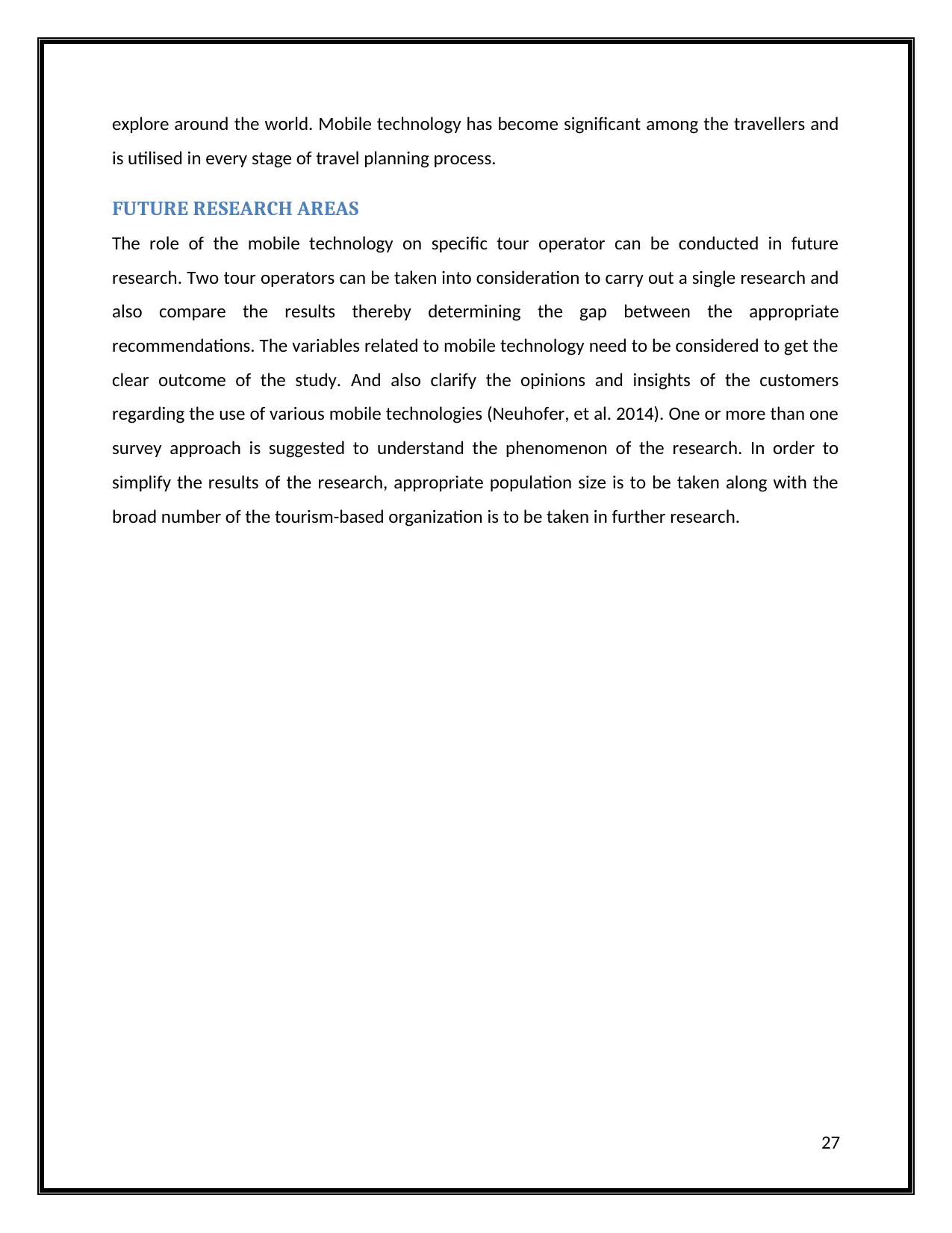
explore around the world. Mobile technology has become significant among the travellers and
is utilised in every stage of travel planning process.
FUTURE RESEARCH AREAS
The role of the mobile technology on specific tour operator can be conducted in future
research. Two tour operators can be taken into consideration to carry out a single research and
also compare the results thereby determining the gap between the appropriate
recommendations. The variables related to mobile technology need to be considered to get the
clear outcome of the study. And also clarify the opinions and insights of the customers
regarding the use of various mobile technologies (Neuhofer, et al. 2014). One or more than one
survey approach is suggested to understand the phenomenon of the research. In order to
simplify the results of the research, appropriate population size is to be taken along with the
broad number of the tourism-based organization is to be taken in further research.
27
is utilised in every stage of travel planning process.
FUTURE RESEARCH AREAS
The role of the mobile technology on specific tour operator can be conducted in future
research. Two tour operators can be taken into consideration to carry out a single research and
also compare the results thereby determining the gap between the appropriate
recommendations. The variables related to mobile technology need to be considered to get the
clear outcome of the study. And also clarify the opinions and insights of the customers
regarding the use of various mobile technologies (Neuhofer, et al. 2014). One or more than one
survey approach is suggested to understand the phenomenon of the research. In order to
simplify the results of the research, appropriate population size is to be taken along with the
broad number of the tourism-based organization is to be taken in further research.
27
Secure Best Marks with AI Grader
Need help grading? Try our AI Grader for instant feedback on your assignments.
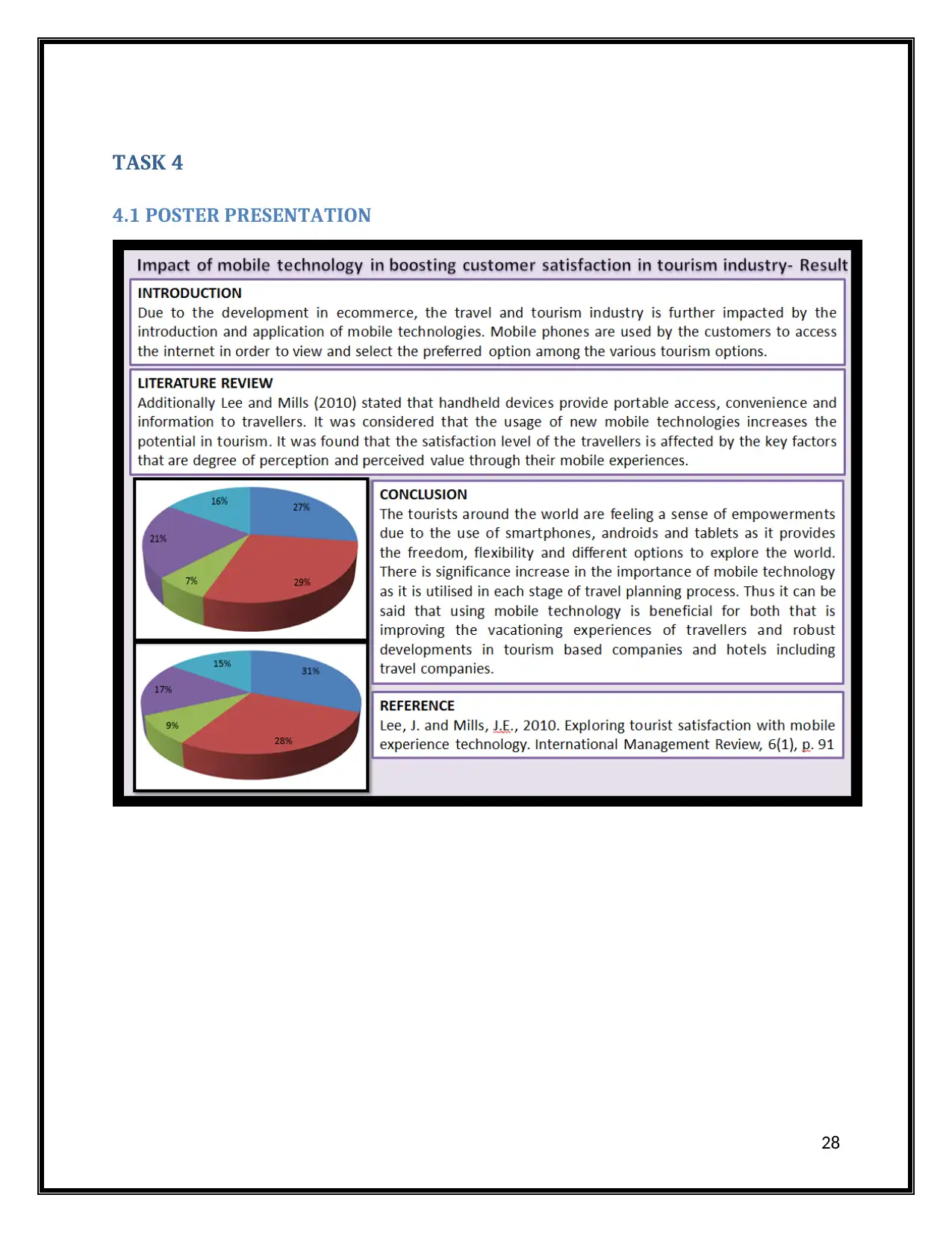
TASK 4
4.1 POSTER PRESENTATION
28
4.1 POSTER PRESENTATION
28
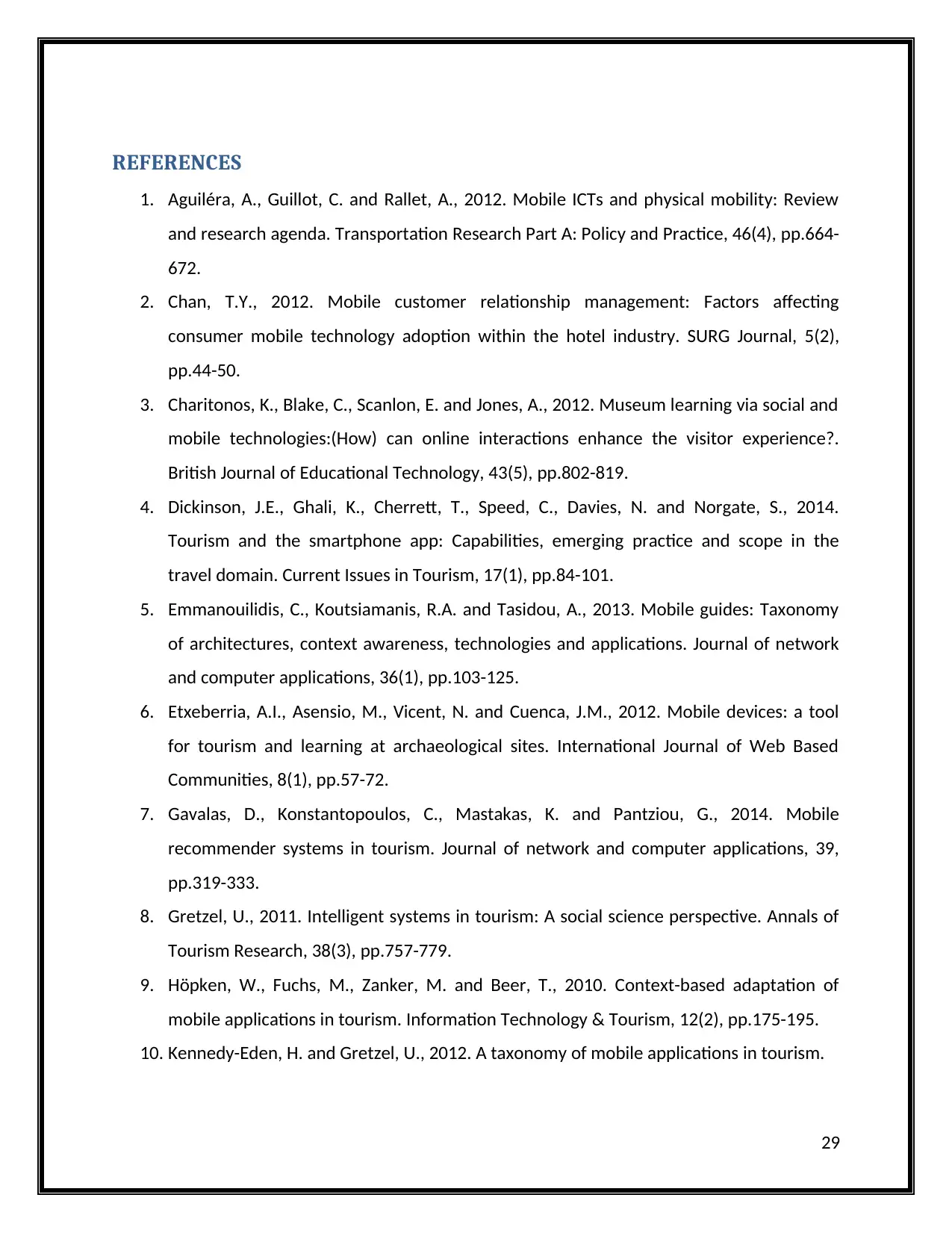
REFERENCES
1. Aguiléra, A., Guillot, C. and Rallet, A., 2012. Mobile ICTs and physical mobility: Review
and research agenda. Transportation Research Part A: Policy and Practice, 46(4), pp.664-
672.
2. Chan, T.Y., 2012. Mobile customer relationship management: Factors affecting
consumer mobile technology adoption within the hotel industry. SURG Journal, 5(2),
pp.44-50.
3. Charitonos, K., Blake, C., Scanlon, E. and Jones, A., 2012. Museum learning via social and
mobile technologies:(How) can online interactions enhance the visitor experience?.
British Journal of Educational Technology, 43(5), pp.802-819.
4. Dickinson, J.E., Ghali, K., Cherrett, T., Speed, C., Davies, N. and Norgate, S., 2014.
Tourism and the smartphone app: Capabilities, emerging practice and scope in the
travel domain. Current Issues in Tourism, 17(1), pp.84-101.
5. Emmanouilidis, C., Koutsiamanis, R.A. and Tasidou, A., 2013. Mobile guides: Taxonomy
of architectures, context awareness, technologies and applications. Journal of network
and computer applications, 36(1), pp.103-125.
6. Etxeberria, A.I., Asensio, M., Vicent, N. and Cuenca, J.M., 2012. Mobile devices: a tool
for tourism and learning at archaeological sites. International Journal of Web Based
Communities, 8(1), pp.57-72.
7. Gavalas, D., Konstantopoulos, C., Mastakas, K. and Pantziou, G., 2014. Mobile
recommender systems in tourism. Journal of network and computer applications, 39,
pp.319-333.
8. Gretzel, U., 2011. Intelligent systems in tourism: A social science perspective. Annals of
Tourism Research, 38(3), pp.757-779.
9. Höpken, W., Fuchs, M., Zanker, M. and Beer, T., 2010. Context-based adaptation of
mobile applications in tourism. Information Technology & Tourism, 12(2), pp.175-195.
10. Kennedy-Eden, H. and Gretzel, U., 2012. A taxonomy of mobile applications in tourism.
29
1. Aguiléra, A., Guillot, C. and Rallet, A., 2012. Mobile ICTs and physical mobility: Review
and research agenda. Transportation Research Part A: Policy and Practice, 46(4), pp.664-
672.
2. Chan, T.Y., 2012. Mobile customer relationship management: Factors affecting
consumer mobile technology adoption within the hotel industry. SURG Journal, 5(2),
pp.44-50.
3. Charitonos, K., Blake, C., Scanlon, E. and Jones, A., 2012. Museum learning via social and
mobile technologies:(How) can online interactions enhance the visitor experience?.
British Journal of Educational Technology, 43(5), pp.802-819.
4. Dickinson, J.E., Ghali, K., Cherrett, T., Speed, C., Davies, N. and Norgate, S., 2014.
Tourism and the smartphone app: Capabilities, emerging practice and scope in the
travel domain. Current Issues in Tourism, 17(1), pp.84-101.
5. Emmanouilidis, C., Koutsiamanis, R.A. and Tasidou, A., 2013. Mobile guides: Taxonomy
of architectures, context awareness, technologies and applications. Journal of network
and computer applications, 36(1), pp.103-125.
6. Etxeberria, A.I., Asensio, M., Vicent, N. and Cuenca, J.M., 2012. Mobile devices: a tool
for tourism and learning at archaeological sites. International Journal of Web Based
Communities, 8(1), pp.57-72.
7. Gavalas, D., Konstantopoulos, C., Mastakas, K. and Pantziou, G., 2014. Mobile
recommender systems in tourism. Journal of network and computer applications, 39,
pp.319-333.
8. Gretzel, U., 2011. Intelligent systems in tourism: A social science perspective. Annals of
Tourism Research, 38(3), pp.757-779.
9. Höpken, W., Fuchs, M., Zanker, M. and Beer, T., 2010. Context-based adaptation of
mobile applications in tourism. Information Technology & Tourism, 12(2), pp.175-195.
10. Kennedy-Eden, H. and Gretzel, U., 2012. A taxonomy of mobile applications in tourism.
29
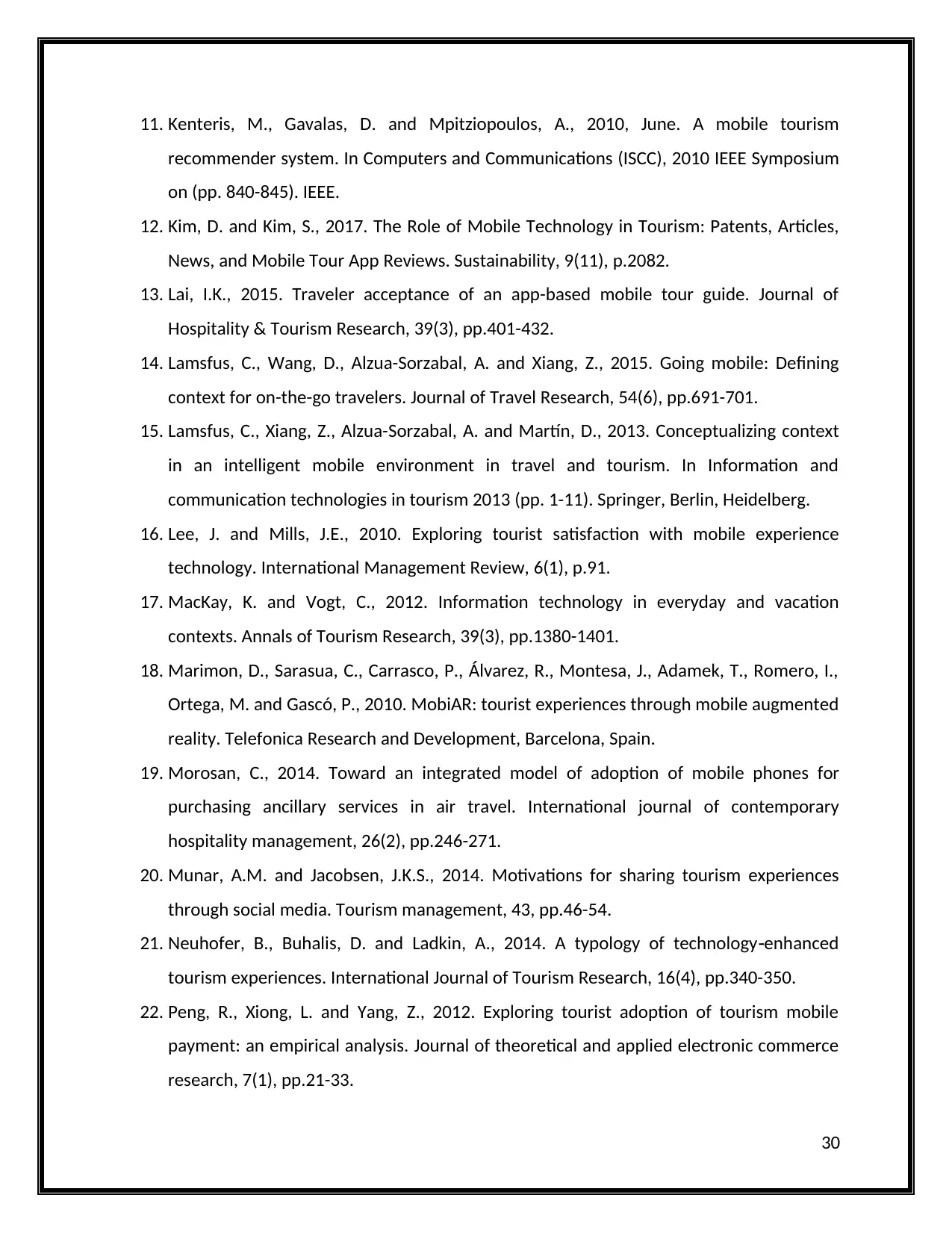
11. Kenteris, M., Gavalas, D. and Mpitziopoulos, A., 2010, June. A mobile tourism
recommender system. In Computers and Communications (ISCC), 2010 IEEE Symposium
on (pp. 840-845). IEEE.
12. Kim, D. and Kim, S., 2017. The Role of Mobile Technology in Tourism: Patents, Articles,
News, and Mobile Tour App Reviews. Sustainability, 9(11), p.2082.
13. Lai, I.K., 2015. Traveler acceptance of an app-based mobile tour guide. Journal of
Hospitality & Tourism Research, 39(3), pp.401-432.
14. Lamsfus, C., Wang, D., Alzua-Sorzabal, A. and Xiang, Z., 2015. Going mobile: Defining
context for on-the-go travelers. Journal of Travel Research, 54(6), pp.691-701.
15. Lamsfus, C., Xiang, Z., Alzua-Sorzabal, A. and Martín, D., 2013. Conceptualizing context
in an intelligent mobile environment in travel and tourism. In Information and
communication technologies in tourism 2013 (pp. 1-11). Springer, Berlin, Heidelberg.
16. Lee, J. and Mills, J.E., 2010. Exploring tourist satisfaction with mobile experience
technology. International Management Review, 6(1), p.91.
17. MacKay, K. and Vogt, C., 2012. Information technology in everyday and vacation
contexts. Annals of Tourism Research, 39(3), pp.1380-1401.
18. Marimon, D., Sarasua, C., Carrasco, P., Álvarez, R., Montesa, J., Adamek, T., Romero, I.,
Ortega, M. and Gascó, P., 2010. MobiAR: tourist experiences through mobile augmented
reality. Telefonica Research and Development, Barcelona, Spain.
19. Morosan, C., 2014. Toward an integrated model of adoption of mobile phones for
purchasing ancillary services in air travel. International journal of contemporary
hospitality management, 26(2), pp.246-271.
20. Munar, A.M. and Jacobsen, J.K.S., 2014. Motivations for sharing tourism experiences
through social media. Tourism management, 43, pp.46-54.
21. Neuhofer, B., Buhalis, D. and Ladkin, A., 2014. A typology of technology enhanced‐
tourism experiences. International Journal of Tourism Research, 16(4), pp.340-350.
22. Peng, R., Xiong, L. and Yang, Z., 2012. Exploring tourist adoption of tourism mobile
payment: an empirical analysis. Journal of theoretical and applied electronic commerce
research, 7(1), pp.21-33.
30
recommender system. In Computers and Communications (ISCC), 2010 IEEE Symposium
on (pp. 840-845). IEEE.
12. Kim, D. and Kim, S., 2017. The Role of Mobile Technology in Tourism: Patents, Articles,
News, and Mobile Tour App Reviews. Sustainability, 9(11), p.2082.
13. Lai, I.K., 2015. Traveler acceptance of an app-based mobile tour guide. Journal of
Hospitality & Tourism Research, 39(3), pp.401-432.
14. Lamsfus, C., Wang, D., Alzua-Sorzabal, A. and Xiang, Z., 2015. Going mobile: Defining
context for on-the-go travelers. Journal of Travel Research, 54(6), pp.691-701.
15. Lamsfus, C., Xiang, Z., Alzua-Sorzabal, A. and Martín, D., 2013. Conceptualizing context
in an intelligent mobile environment in travel and tourism. In Information and
communication technologies in tourism 2013 (pp. 1-11). Springer, Berlin, Heidelberg.
16. Lee, J. and Mills, J.E., 2010. Exploring tourist satisfaction with mobile experience
technology. International Management Review, 6(1), p.91.
17. MacKay, K. and Vogt, C., 2012. Information technology in everyday and vacation
contexts. Annals of Tourism Research, 39(3), pp.1380-1401.
18. Marimon, D., Sarasua, C., Carrasco, P., Álvarez, R., Montesa, J., Adamek, T., Romero, I.,
Ortega, M. and Gascó, P., 2010. MobiAR: tourist experiences through mobile augmented
reality. Telefonica Research and Development, Barcelona, Spain.
19. Morosan, C., 2014. Toward an integrated model of adoption of mobile phones for
purchasing ancillary services in air travel. International journal of contemporary
hospitality management, 26(2), pp.246-271.
20. Munar, A.M. and Jacobsen, J.K.S., 2014. Motivations for sharing tourism experiences
through social media. Tourism management, 43, pp.46-54.
21. Neuhofer, B., Buhalis, D. and Ladkin, A., 2014. A typology of technology enhanced‐
tourism experiences. International Journal of Tourism Research, 16(4), pp.340-350.
22. Peng, R., Xiong, L. and Yang, Z., 2012. Exploring tourist adoption of tourism mobile
payment: an empirical analysis. Journal of theoretical and applied electronic commerce
research, 7(1), pp.21-33.
30
Paraphrase This Document
Need a fresh take? Get an instant paraphrase of this document with our AI Paraphraser
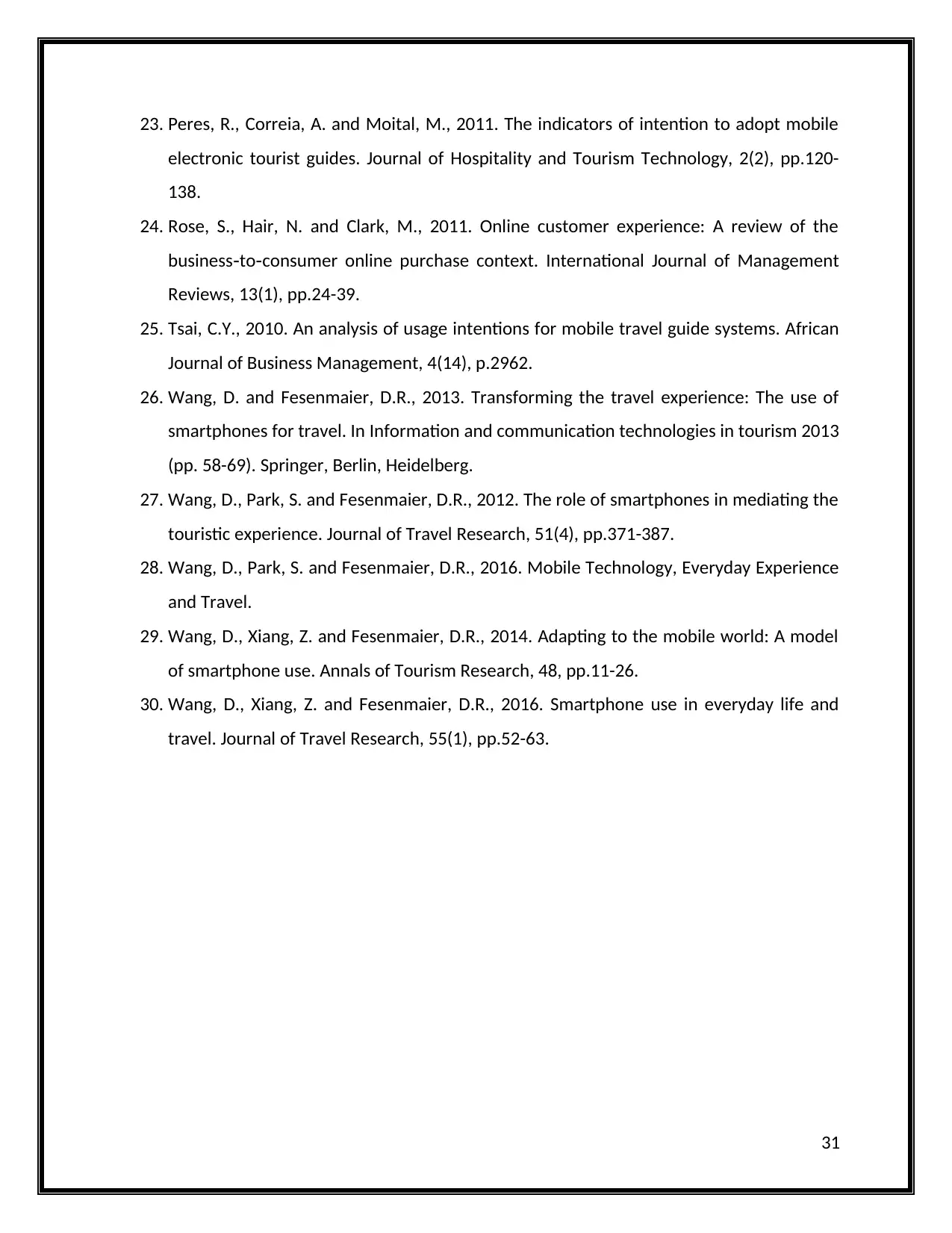
23. Peres, R., Correia, A. and Moital, M., 2011. The indicators of intention to adopt mobile
electronic tourist guides. Journal of Hospitality and Tourism Technology, 2(2), pp.120-
138.
24. Rose, S., Hair, N. and Clark, M., 2011. Online customer experience: A review of the
business to consumer online purchase context. International Journal of Management‐ ‐
Reviews, 13(1), pp.24-39.
25. Tsai, C.Y., 2010. An analysis of usage intentions for mobile travel guide systems. African
Journal of Business Management, 4(14), p.2962.
26. Wang, D. and Fesenmaier, D.R., 2013. Transforming the travel experience: The use of
smartphones for travel. In Information and communication technologies in tourism 2013
(pp. 58-69). Springer, Berlin, Heidelberg.
27. Wang, D., Park, S. and Fesenmaier, D.R., 2012. The role of smartphones in mediating the
touristic experience. Journal of Travel Research, 51(4), pp.371-387.
28. Wang, D., Park, S. and Fesenmaier, D.R., 2016. Mobile Technology, Everyday Experience
and Travel.
29. Wang, D., Xiang, Z. and Fesenmaier, D.R., 2014. Adapting to the mobile world: A model
of smartphone use. Annals of Tourism Research, 48, pp.11-26.
30. Wang, D., Xiang, Z. and Fesenmaier, D.R., 2016. Smartphone use in everyday life and
travel. Journal of Travel Research, 55(1), pp.52-63.
31
electronic tourist guides. Journal of Hospitality and Tourism Technology, 2(2), pp.120-
138.
24. Rose, S., Hair, N. and Clark, M., 2011. Online customer experience: A review of the
business to consumer online purchase context. International Journal of Management‐ ‐
Reviews, 13(1), pp.24-39.
25. Tsai, C.Y., 2010. An analysis of usage intentions for mobile travel guide systems. African
Journal of Business Management, 4(14), p.2962.
26. Wang, D. and Fesenmaier, D.R., 2013. Transforming the travel experience: The use of
smartphones for travel. In Information and communication technologies in tourism 2013
(pp. 58-69). Springer, Berlin, Heidelberg.
27. Wang, D., Park, S. and Fesenmaier, D.R., 2012. The role of smartphones in mediating the
touristic experience. Journal of Travel Research, 51(4), pp.371-387.
28. Wang, D., Park, S. and Fesenmaier, D.R., 2016. Mobile Technology, Everyday Experience
and Travel.
29. Wang, D., Xiang, Z. and Fesenmaier, D.R., 2014. Adapting to the mobile world: A model
of smartphone use. Annals of Tourism Research, 48, pp.11-26.
30. Wang, D., Xiang, Z. and Fesenmaier, D.R., 2016. Smartphone use in everyday life and
travel. Journal of Travel Research, 55(1), pp.52-63.
31
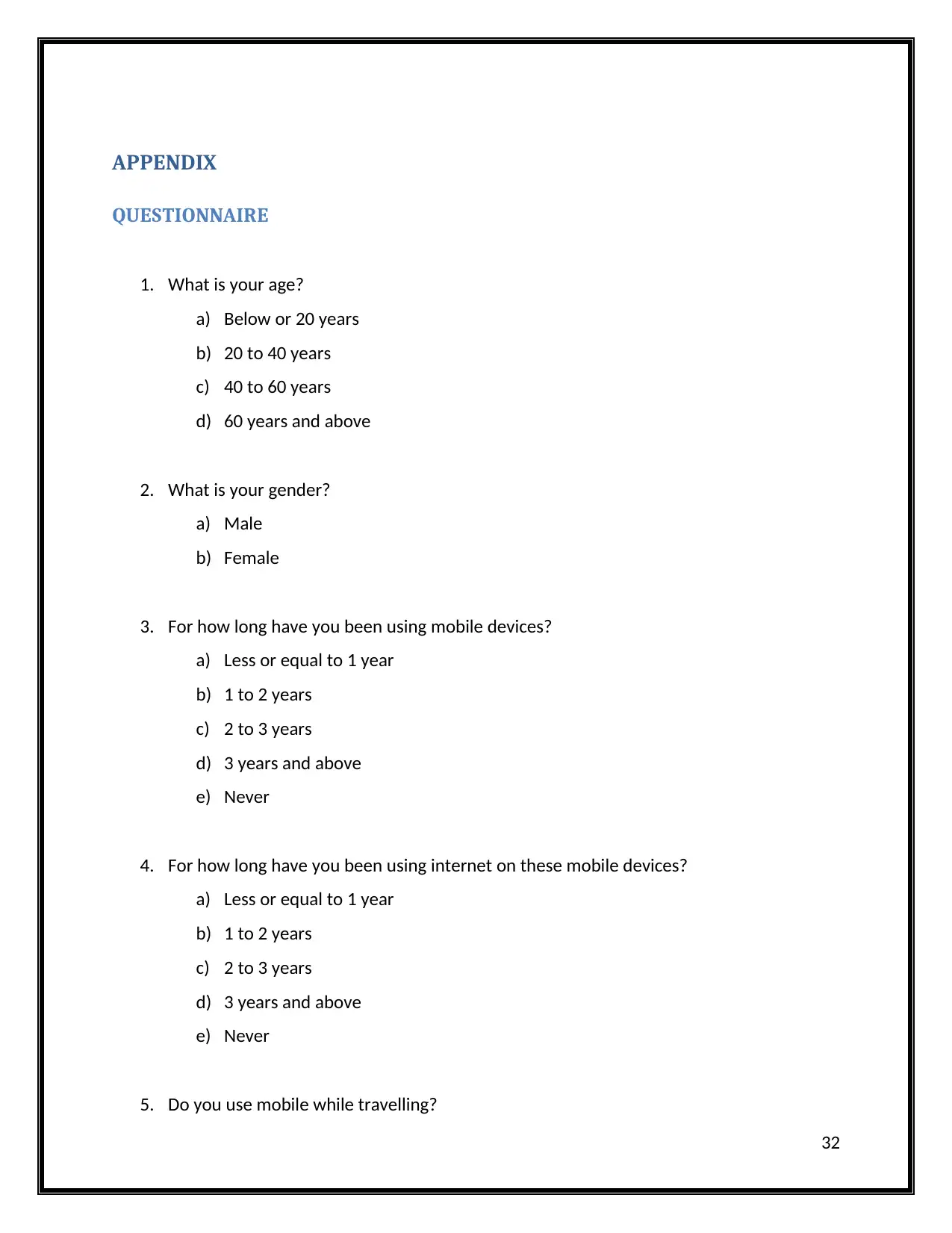
APPENDIX
QUESTIONNAIRE
1. What is your age?
a) Below or 20 years
b) 20 to 40 years
c) 40 to 60 years
d) 60 years and above
2. What is your gender?
a) Male
b) Female
3. For how long have you been using mobile devices?
a) Less or equal to 1 year
b) 1 to 2 years
c) 2 to 3 years
d) 3 years and above
e) Never
4. For how long have you been using internet on these mobile devices?
a) Less or equal to 1 year
b) 1 to 2 years
c) 2 to 3 years
d) 3 years and above
e) Never
5. Do you use mobile while travelling?
32
QUESTIONNAIRE
1. What is your age?
a) Below or 20 years
b) 20 to 40 years
c) 40 to 60 years
d) 60 years and above
2. What is your gender?
a) Male
b) Female
3. For how long have you been using mobile devices?
a) Less or equal to 1 year
b) 1 to 2 years
c) 2 to 3 years
d) 3 years and above
e) Never
4. For how long have you been using internet on these mobile devices?
a) Less or equal to 1 year
b) 1 to 2 years
c) 2 to 3 years
d) 3 years and above
e) Never
5. Do you use mobile while travelling?
32
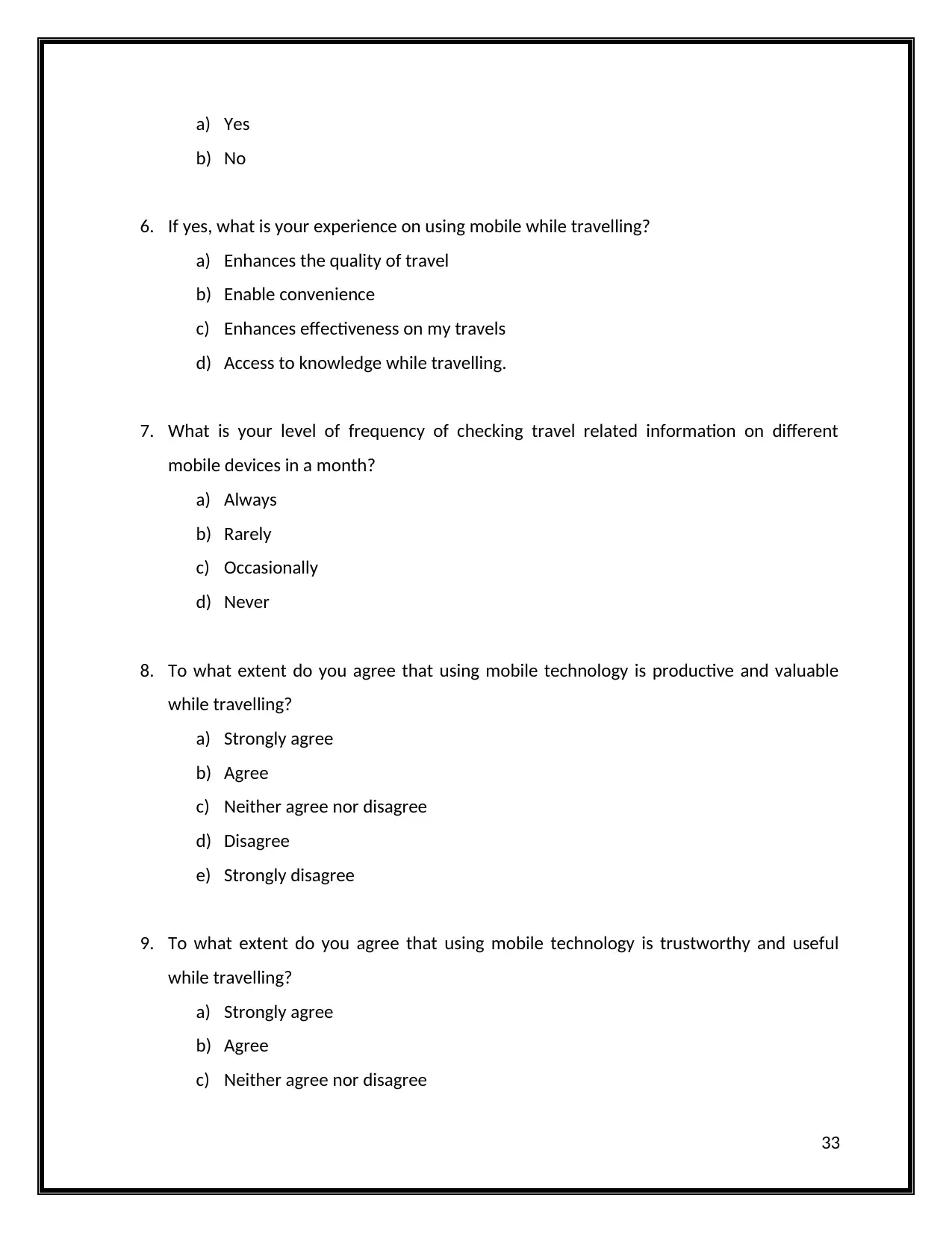
a) Yes
b) No
6. If yes, what is your experience on using mobile while travelling?
a) Enhances the quality of travel
b) Enable convenience
c) Enhances effectiveness on my travels
d) Access to knowledge while travelling.
7. What is your level of frequency of checking travel related information on different
mobile devices in a month?
a) Always
b) Rarely
c) Occasionally
d) Never
8. To what extent do you agree that using mobile technology is productive and valuable
while travelling?
a) Strongly agree
b) Agree
c) Neither agree nor disagree
d) Disagree
e) Strongly disagree
9. To what extent do you agree that using mobile technology is trustworthy and useful
while travelling?
a) Strongly agree
b) Agree
c) Neither agree nor disagree
33
b) No
6. If yes, what is your experience on using mobile while travelling?
a) Enhances the quality of travel
b) Enable convenience
c) Enhances effectiveness on my travels
d) Access to knowledge while travelling.
7. What is your level of frequency of checking travel related information on different
mobile devices in a month?
a) Always
b) Rarely
c) Occasionally
d) Never
8. To what extent do you agree that using mobile technology is productive and valuable
while travelling?
a) Strongly agree
b) Agree
c) Neither agree nor disagree
d) Disagree
e) Strongly disagree
9. To what extent do you agree that using mobile technology is trustworthy and useful
while travelling?
a) Strongly agree
b) Agree
c) Neither agree nor disagree
33
Secure Best Marks with AI Grader
Need help grading? Try our AI Grader for instant feedback on your assignments.
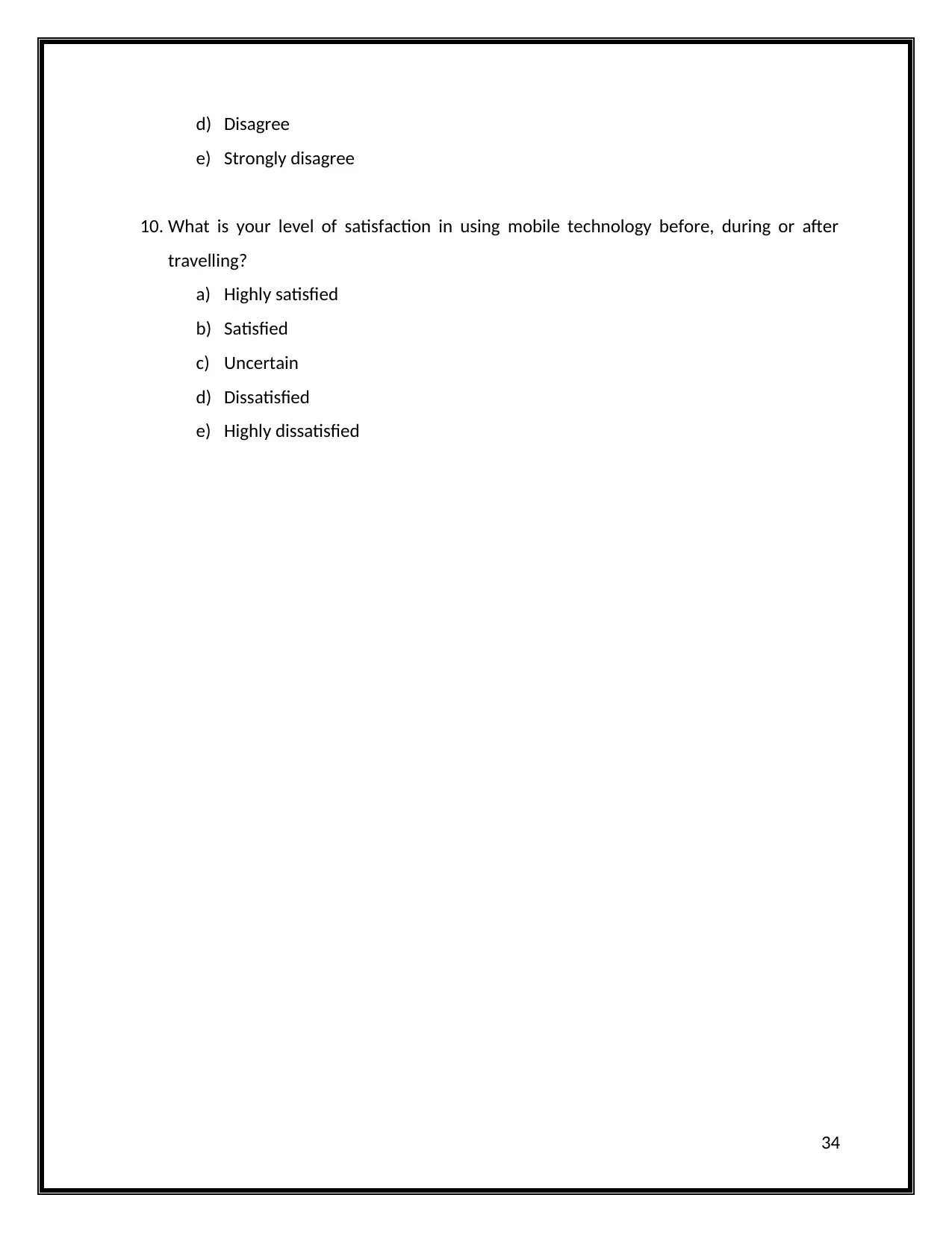
d) Disagree
e) Strongly disagree
10. What is your level of satisfaction in using mobile technology before, during or after
travelling?
a) Highly satisfied
b) Satisfied
c) Uncertain
d) Dissatisfied
e) Highly dissatisfied
34
e) Strongly disagree
10. What is your level of satisfaction in using mobile technology before, during or after
travelling?
a) Highly satisfied
b) Satisfied
c) Uncertain
d) Dissatisfied
e) Highly dissatisfied
34
1 out of 35
Related Documents
Your All-in-One AI-Powered Toolkit for Academic Success.
+13062052269
info@desklib.com
Available 24*7 on WhatsApp / Email
![[object Object]](/_next/static/media/star-bottom.7253800d.svg)
Unlock your academic potential
© 2024 | Zucol Services PVT LTD | All rights reserved.





